Sights Of Great Britain LONDON ST.

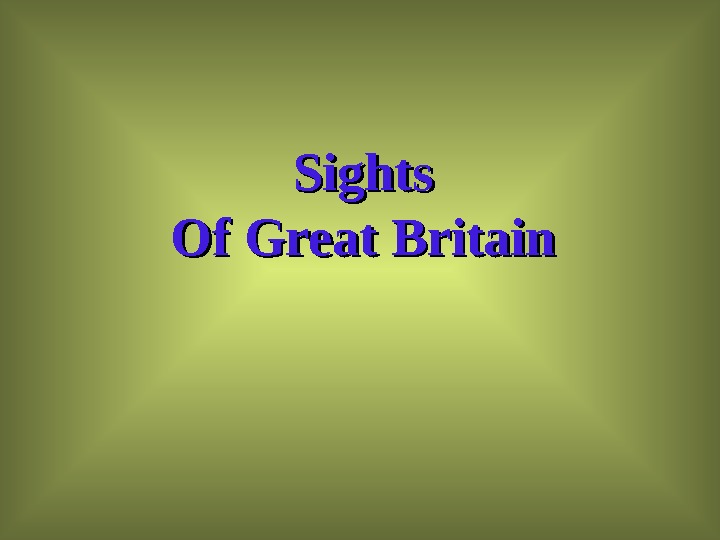
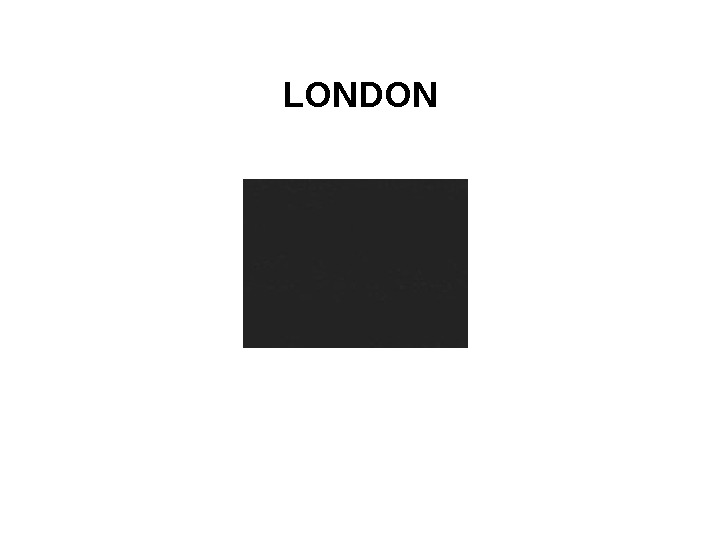
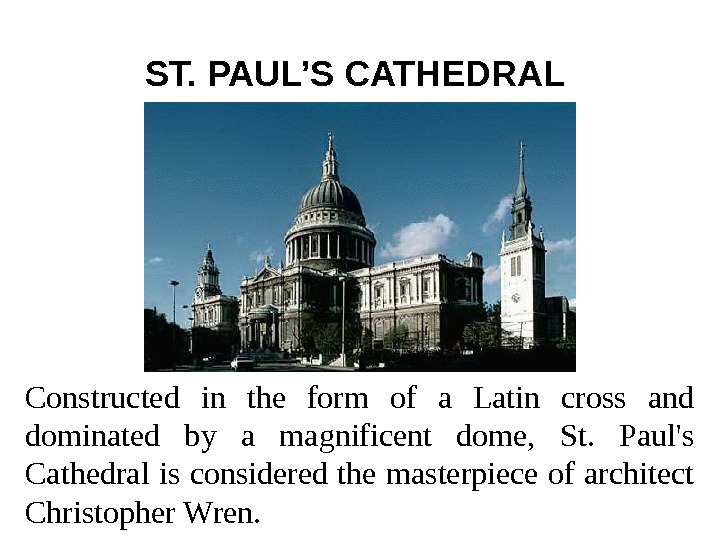
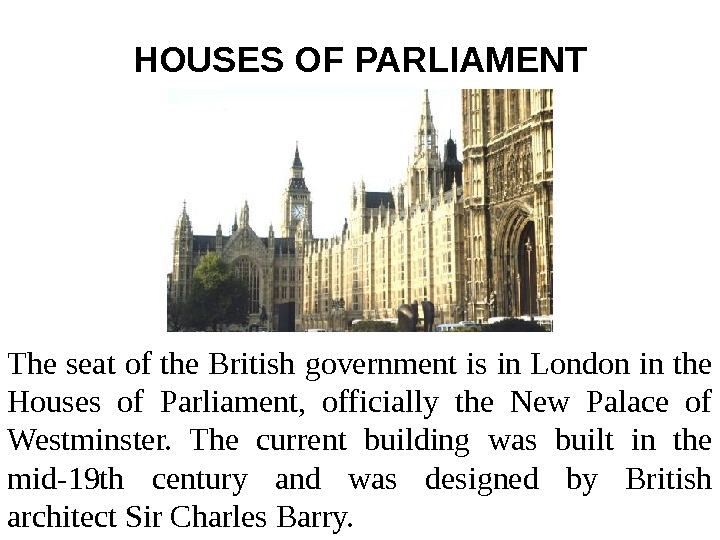

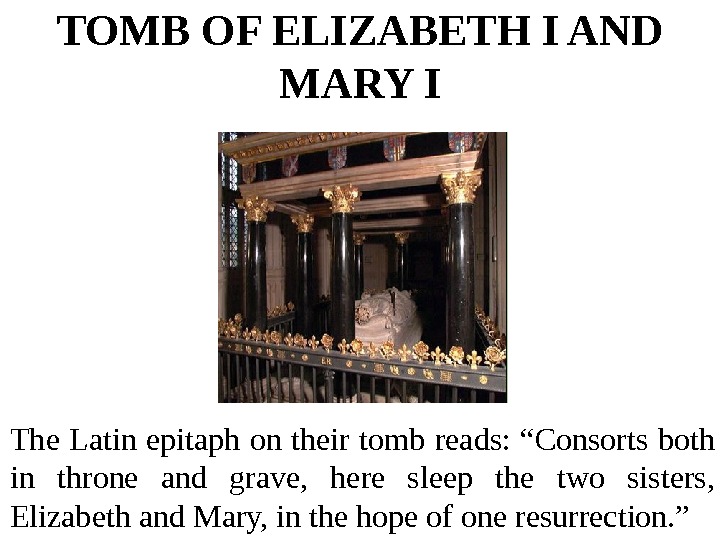
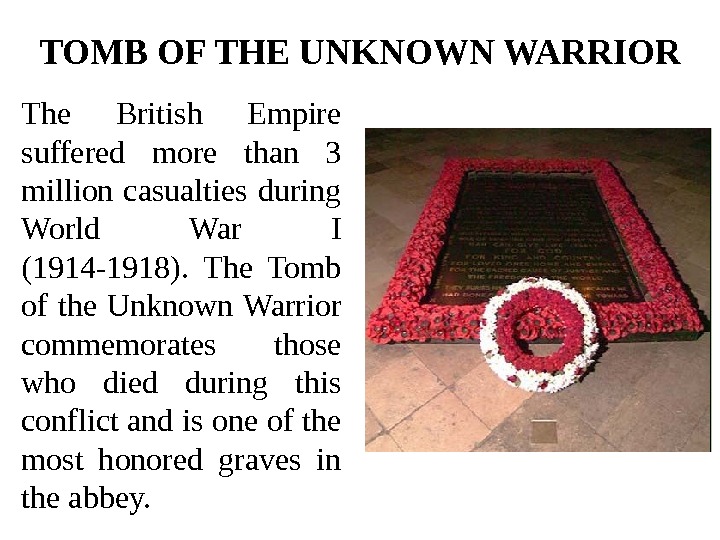
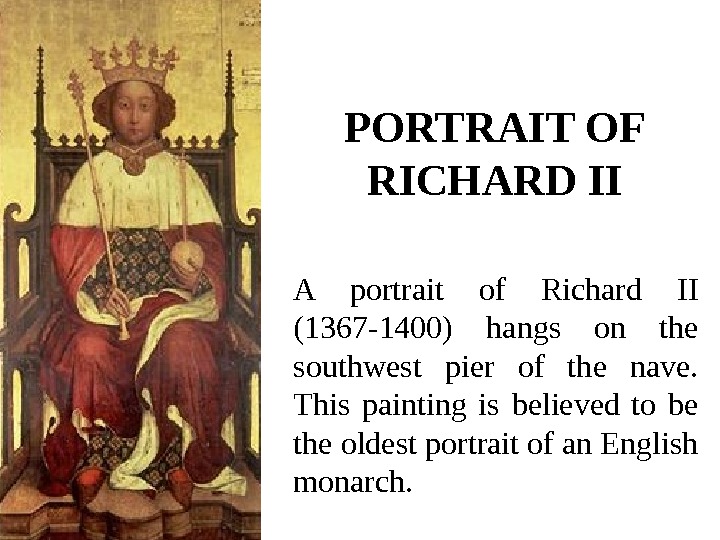


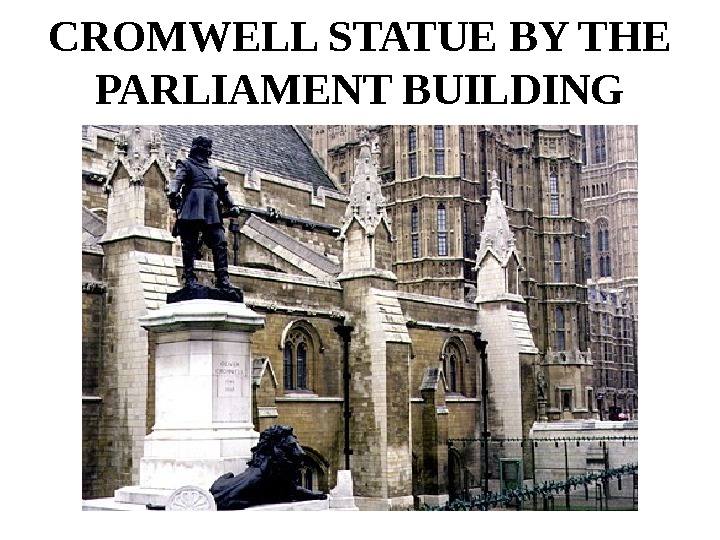
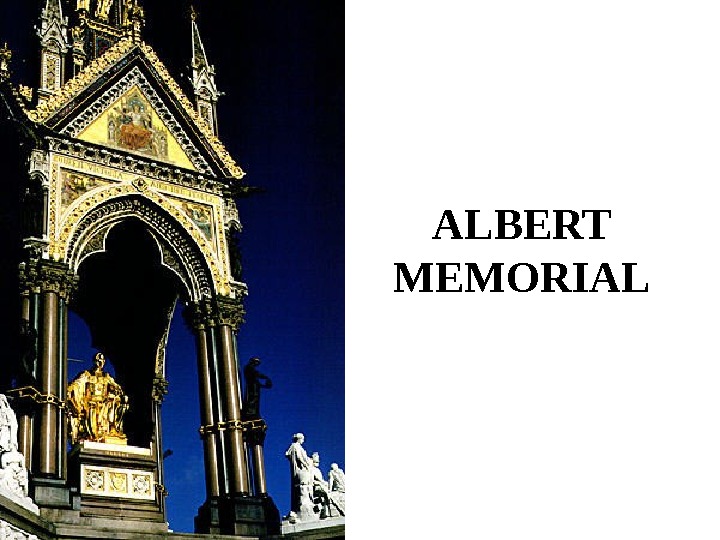
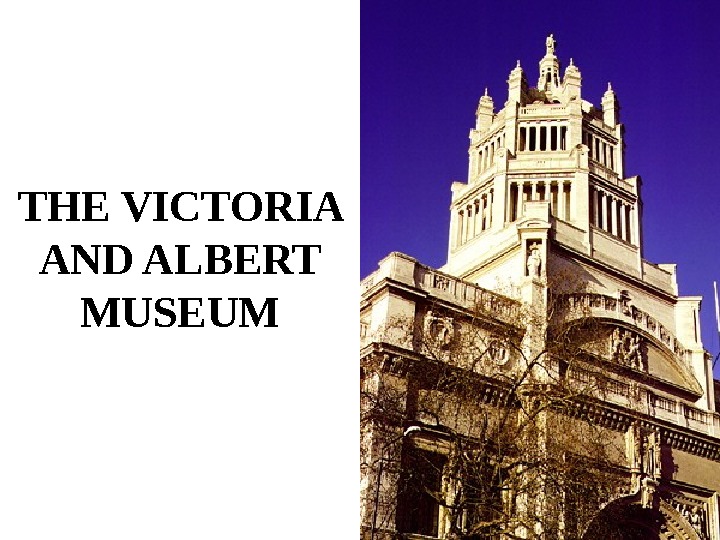
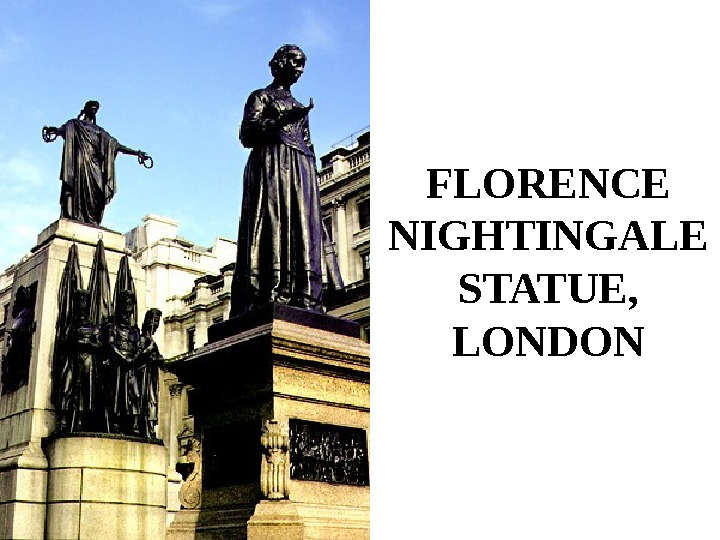
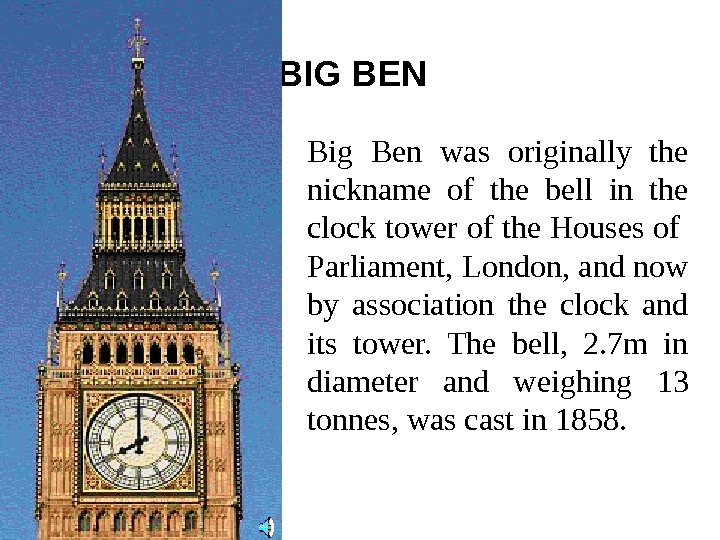
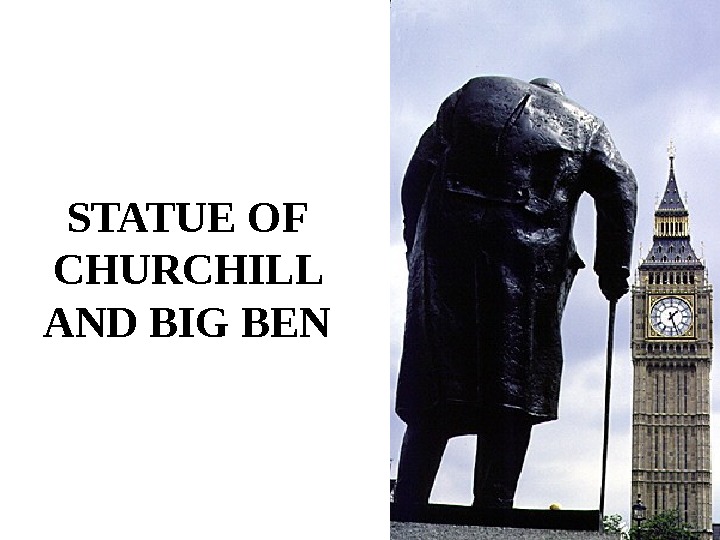
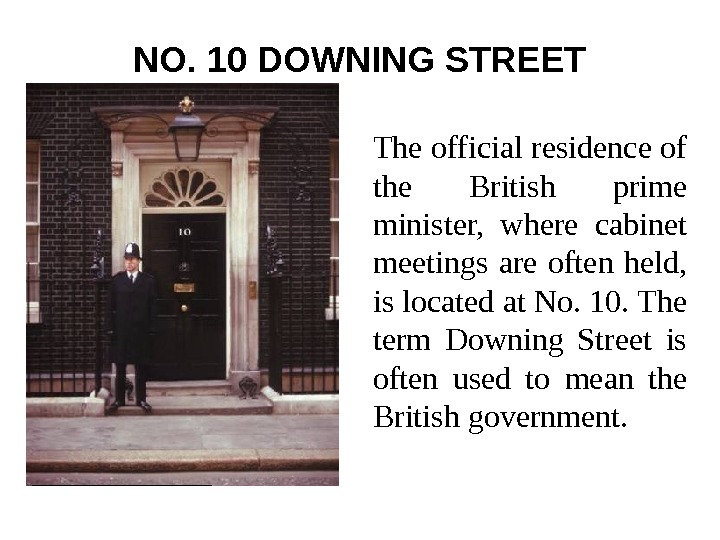
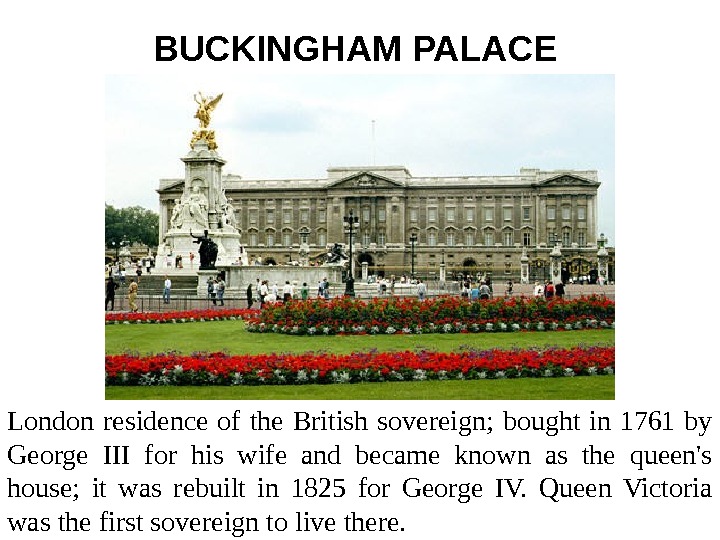
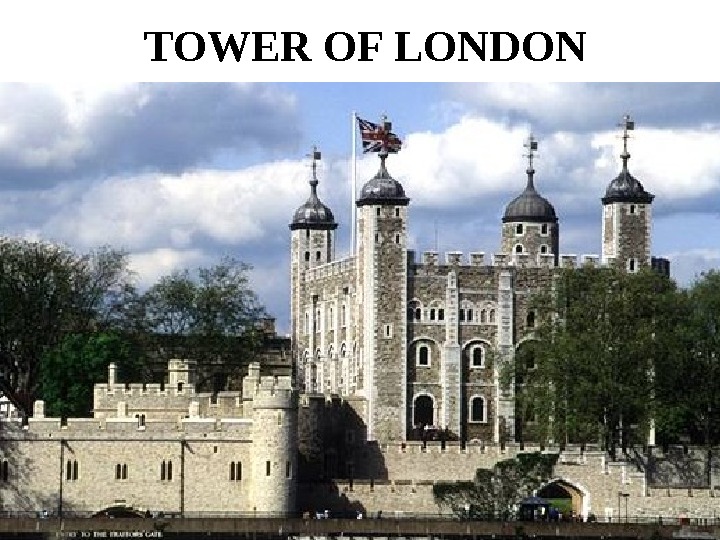
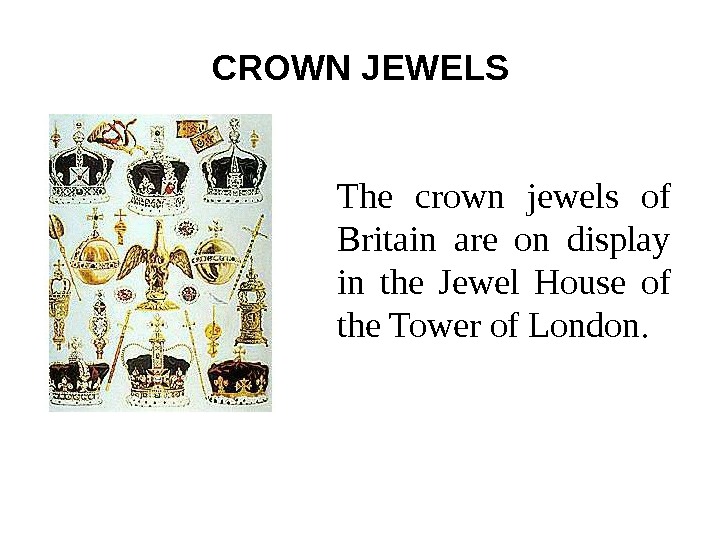
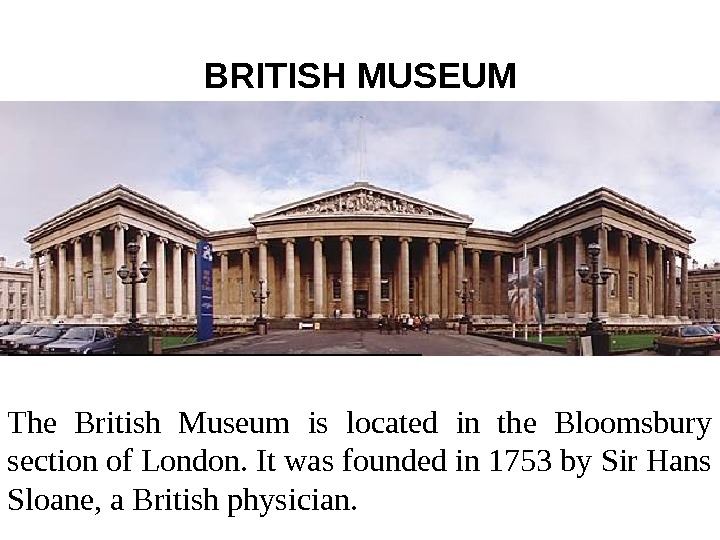
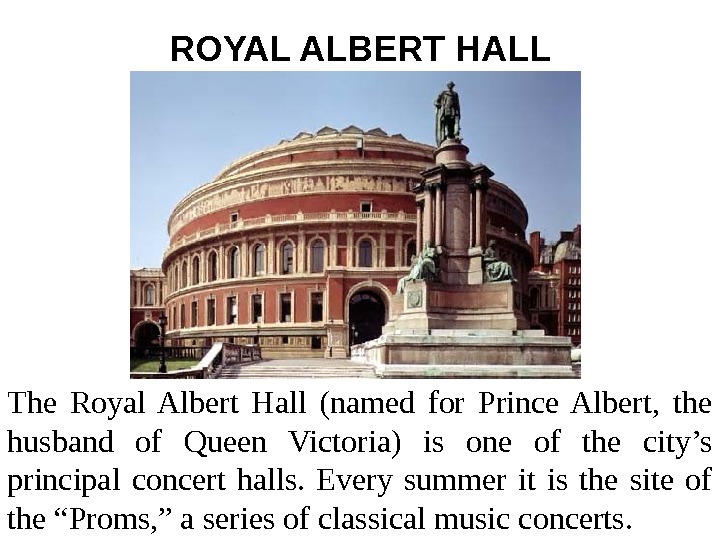

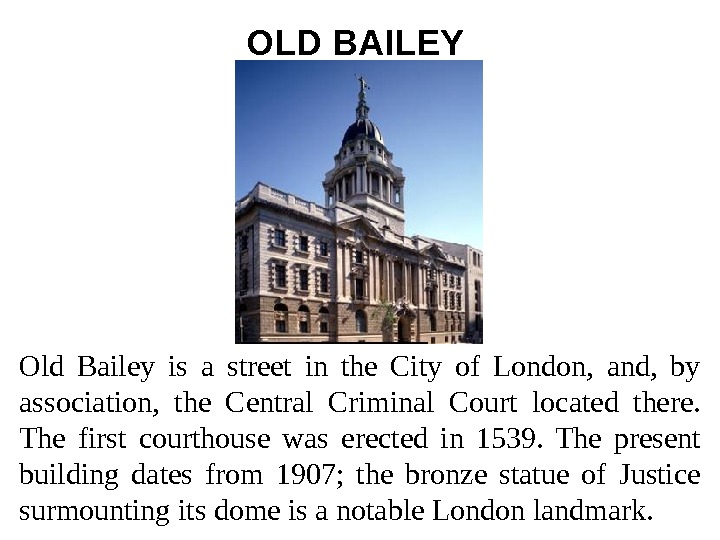
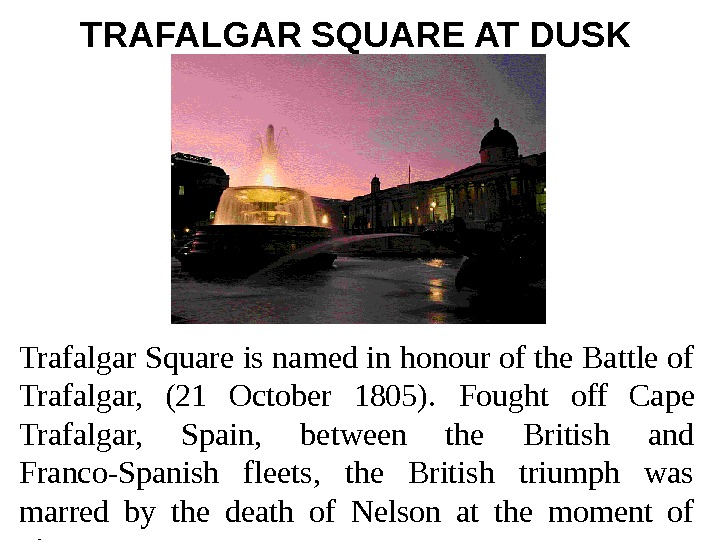
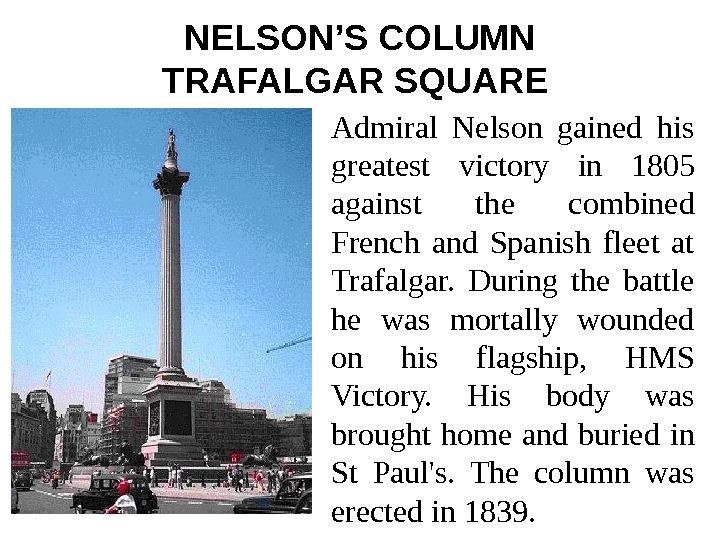
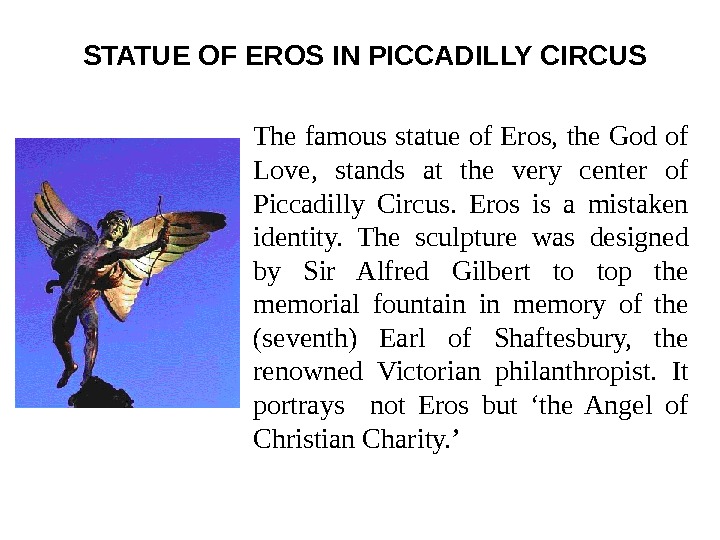
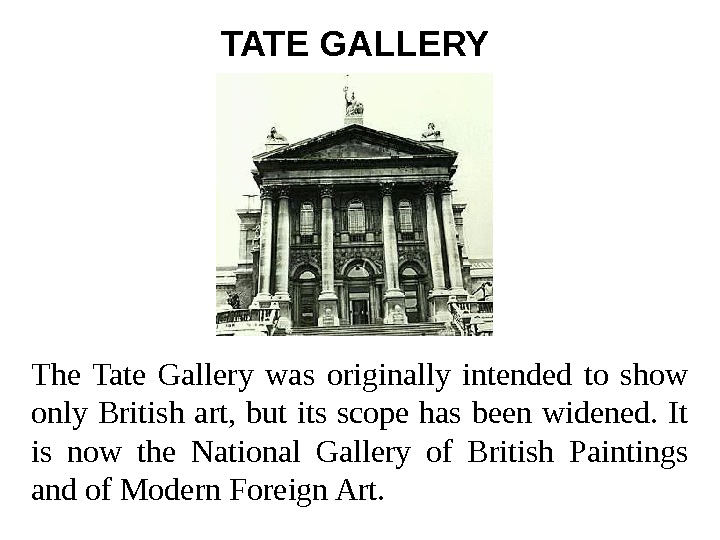
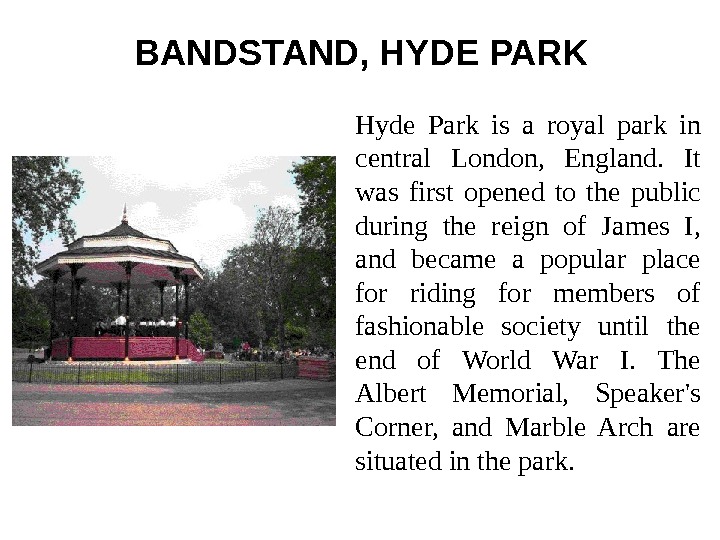
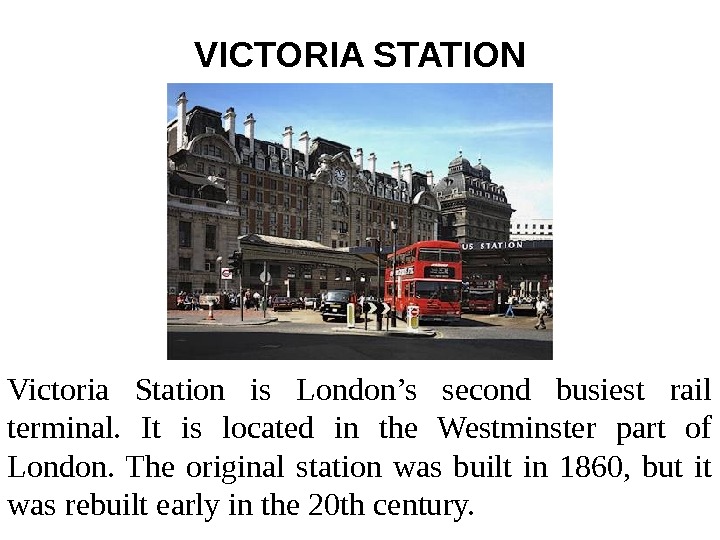
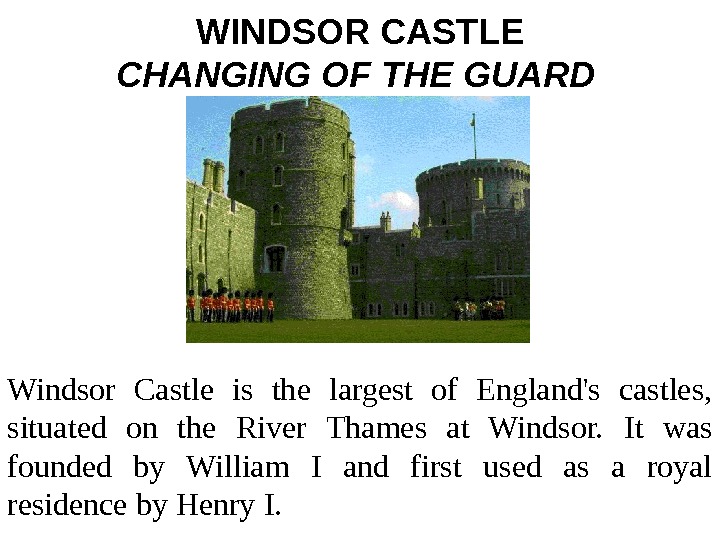

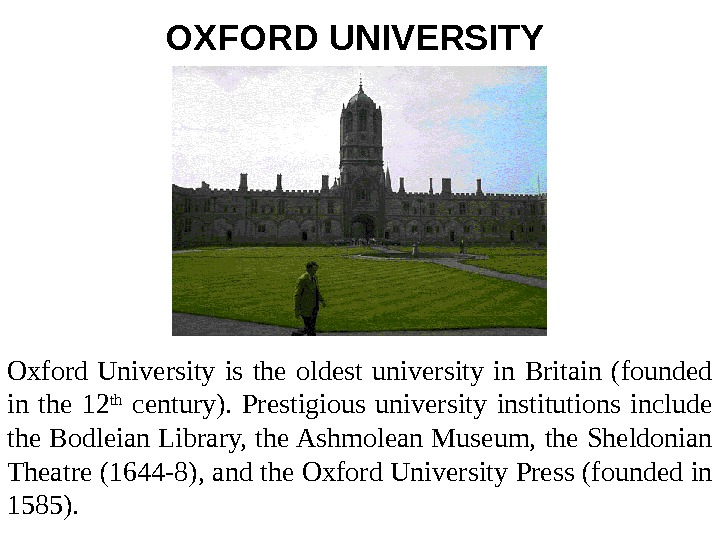
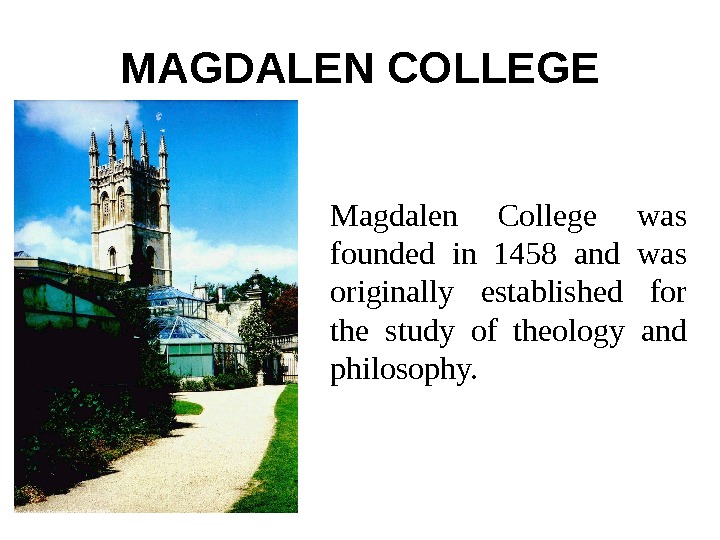
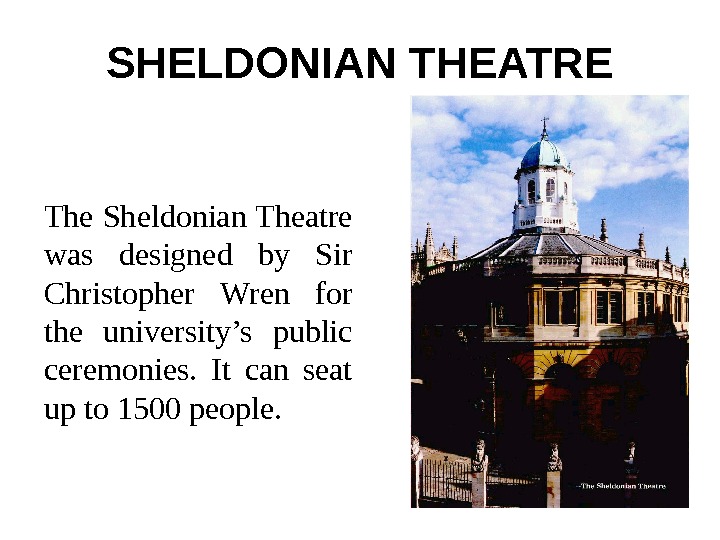


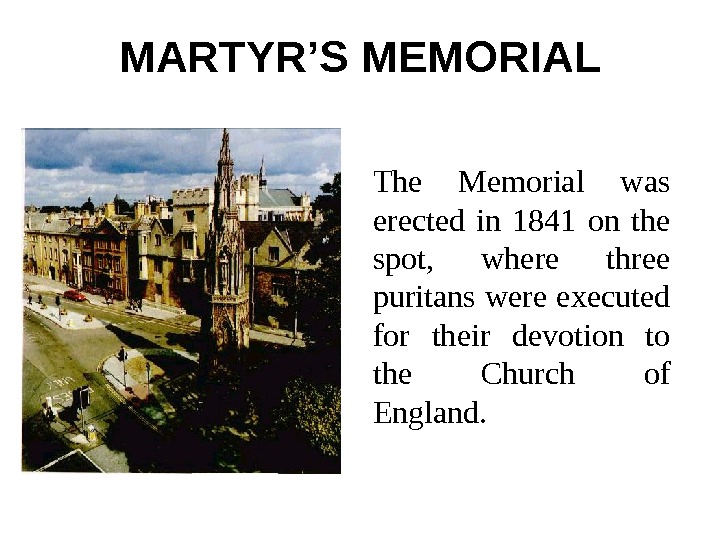
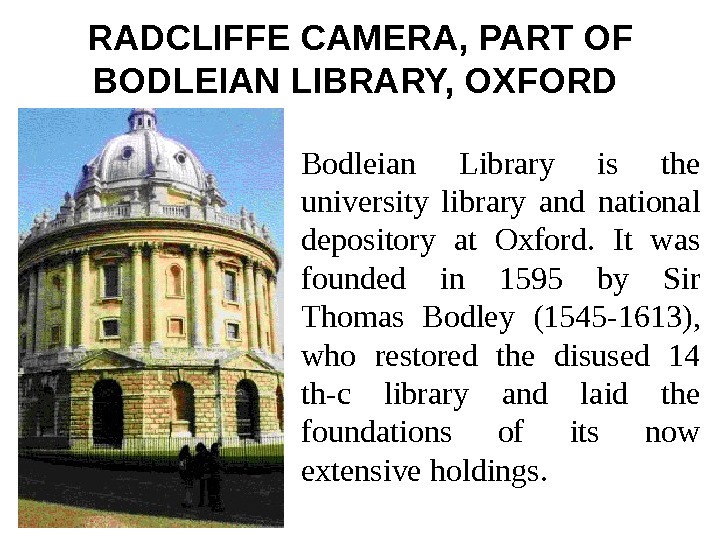
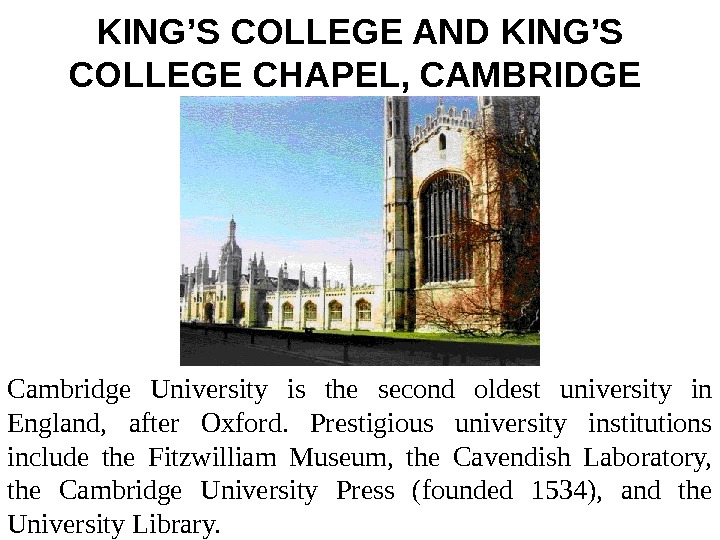
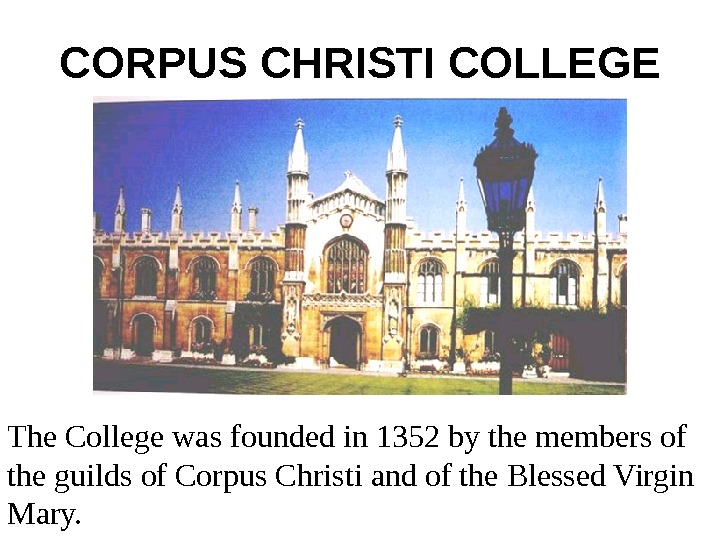
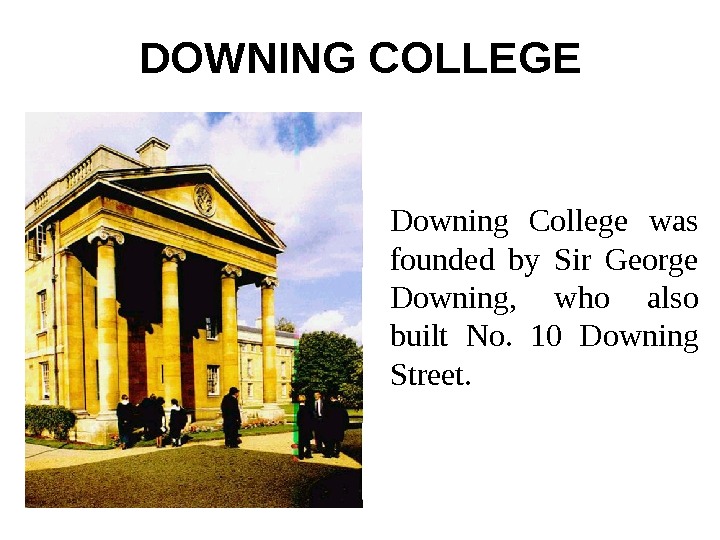
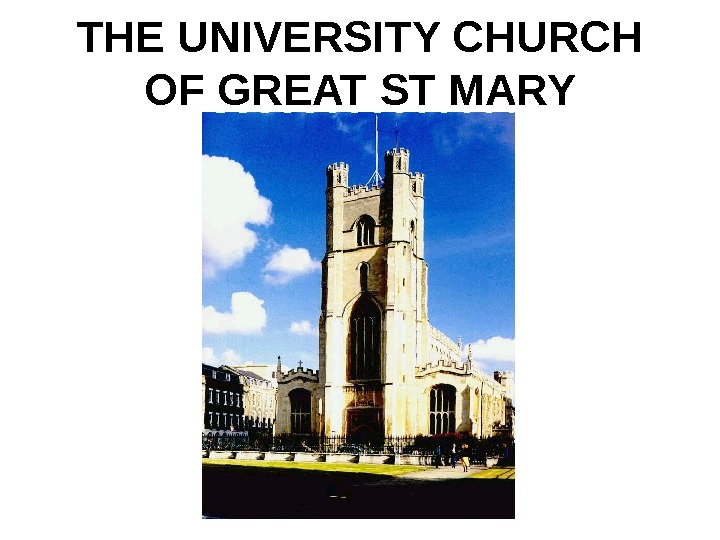
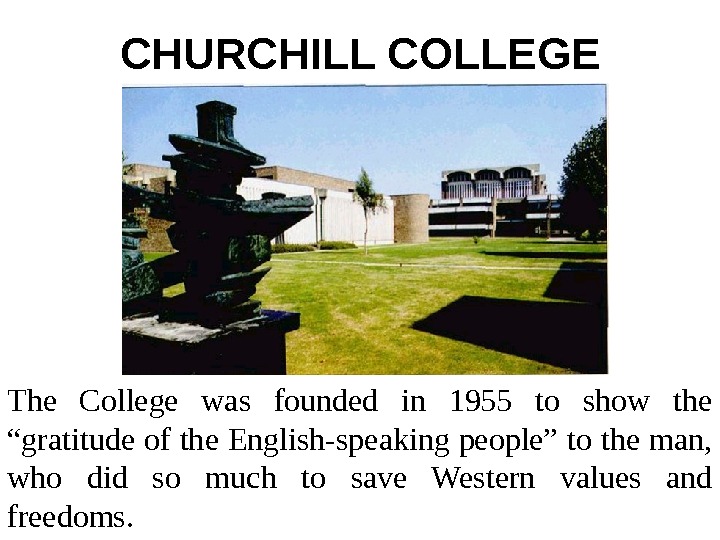
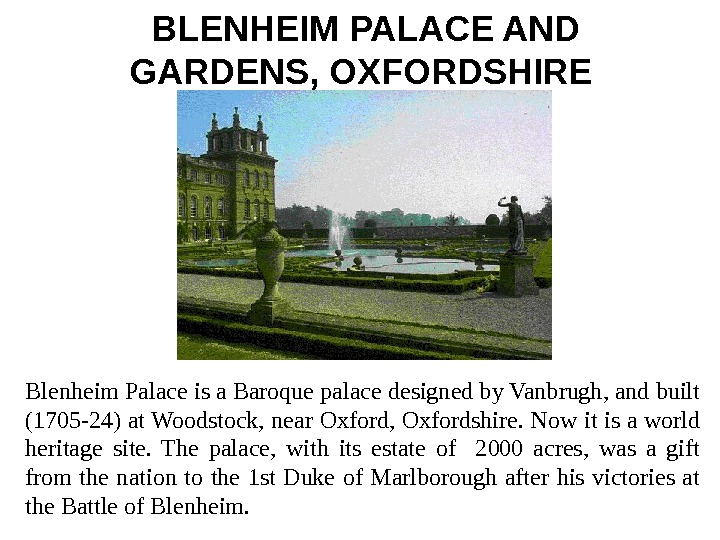
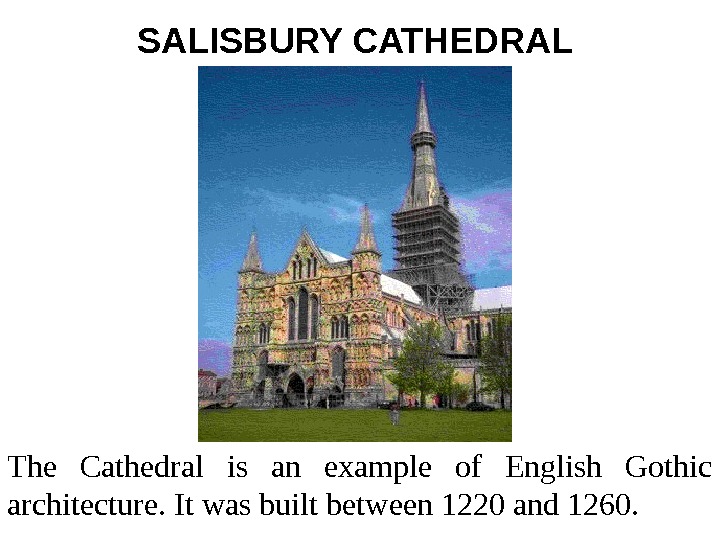
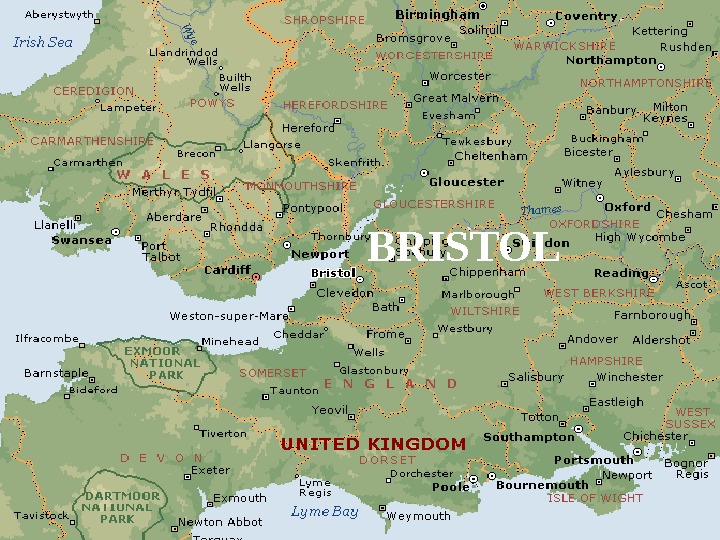
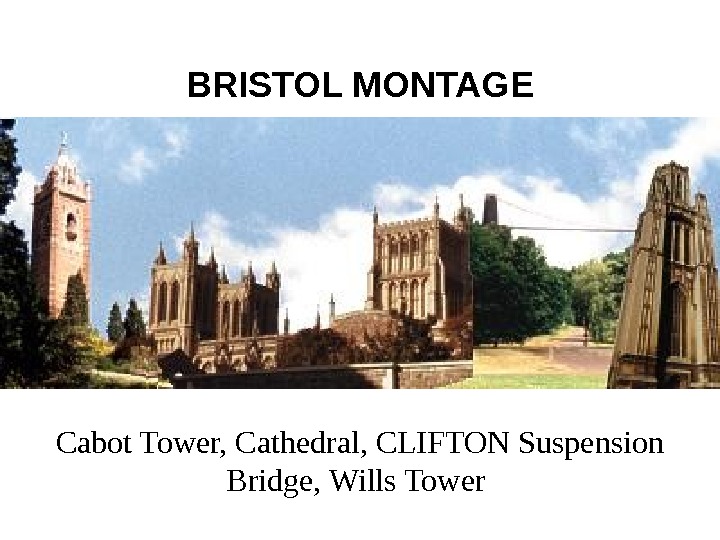
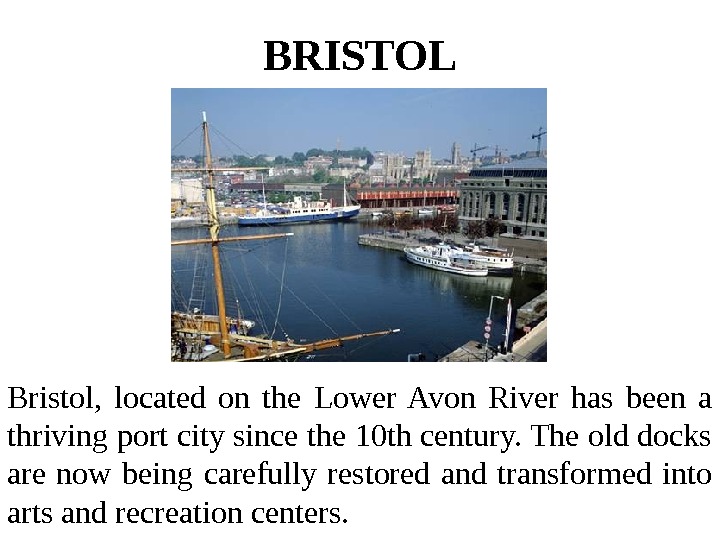


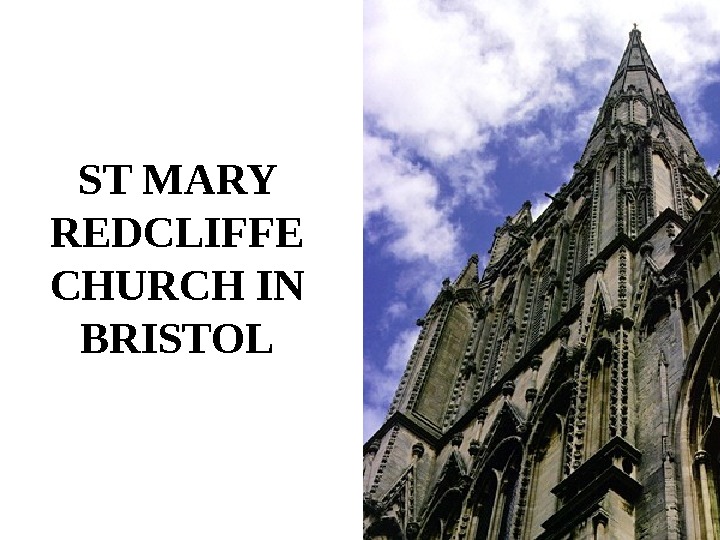
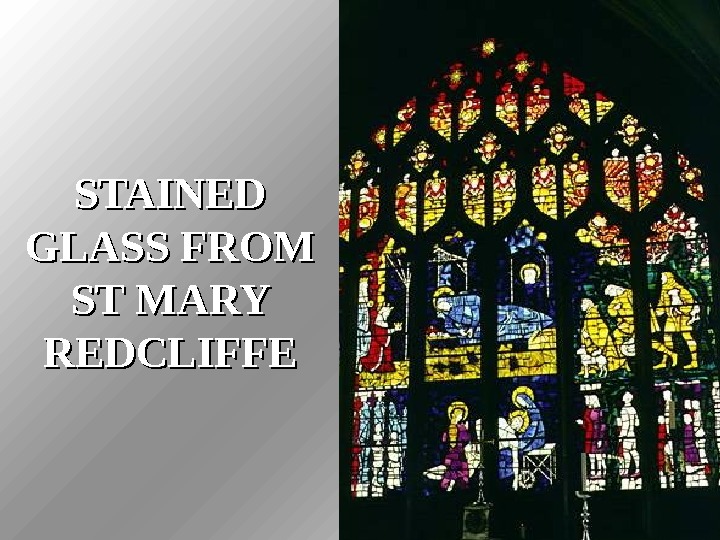
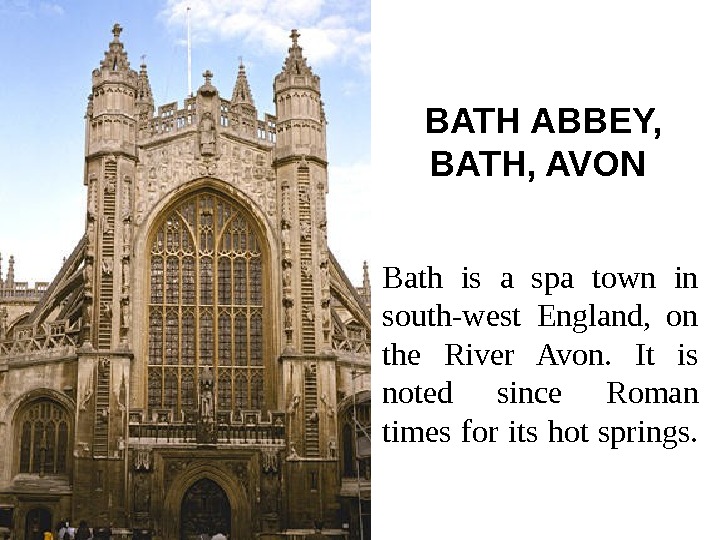
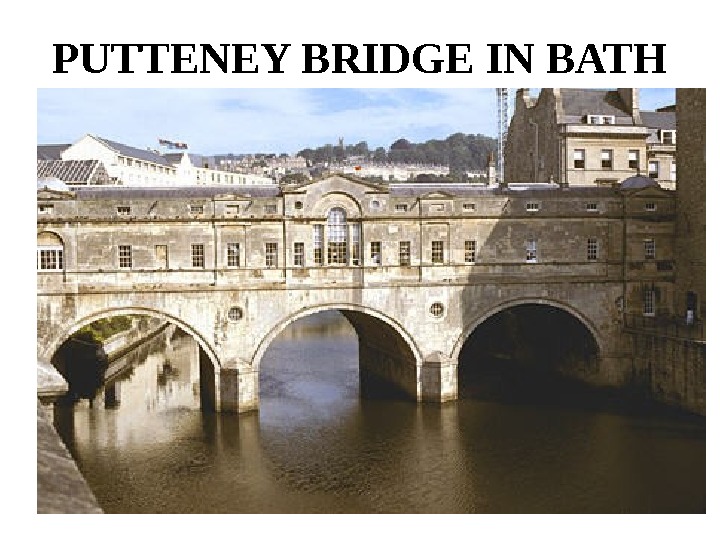
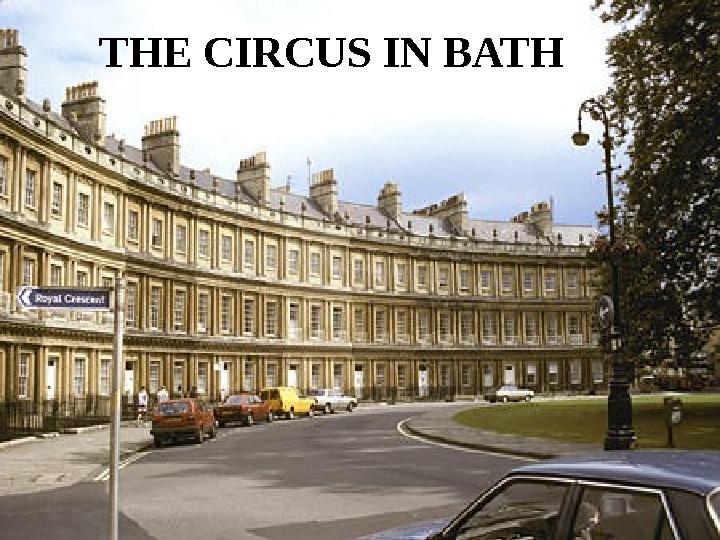
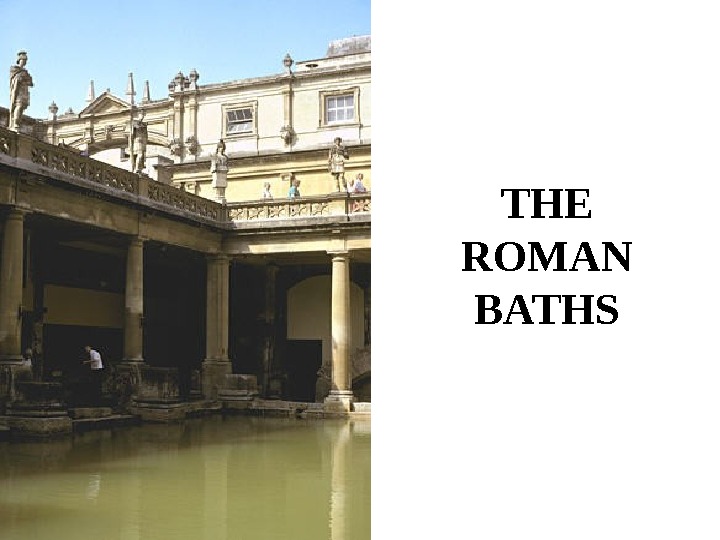
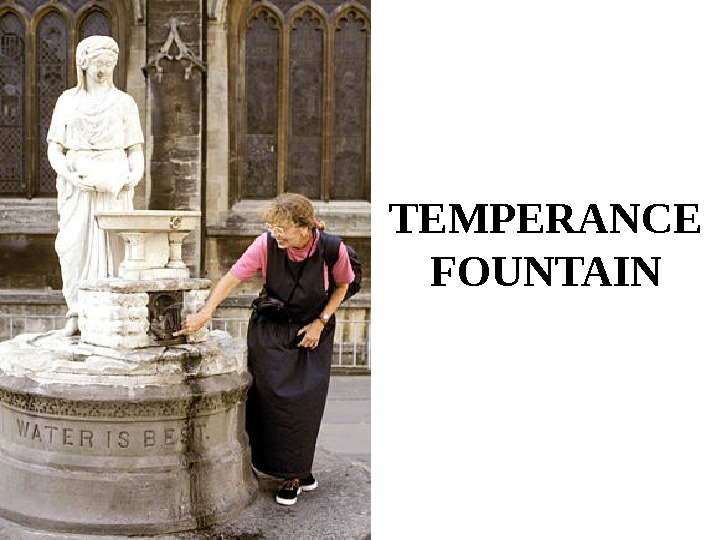



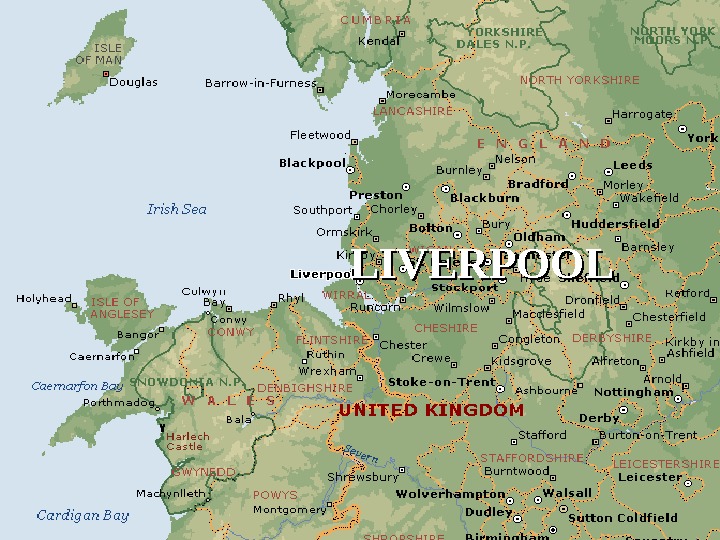
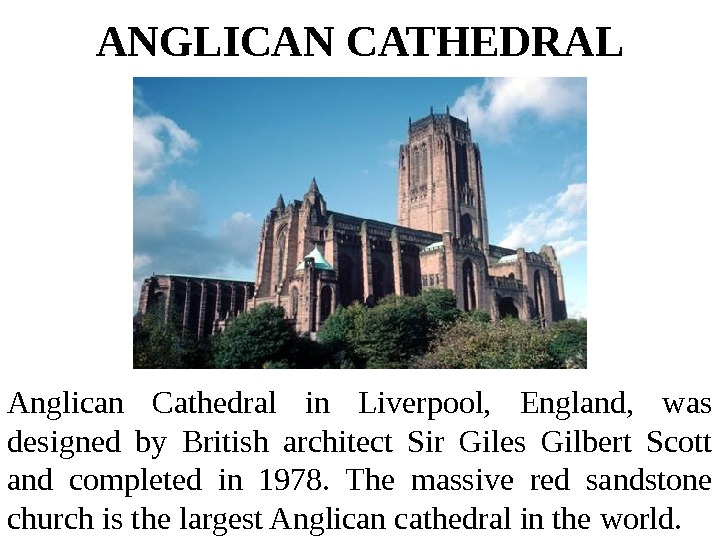
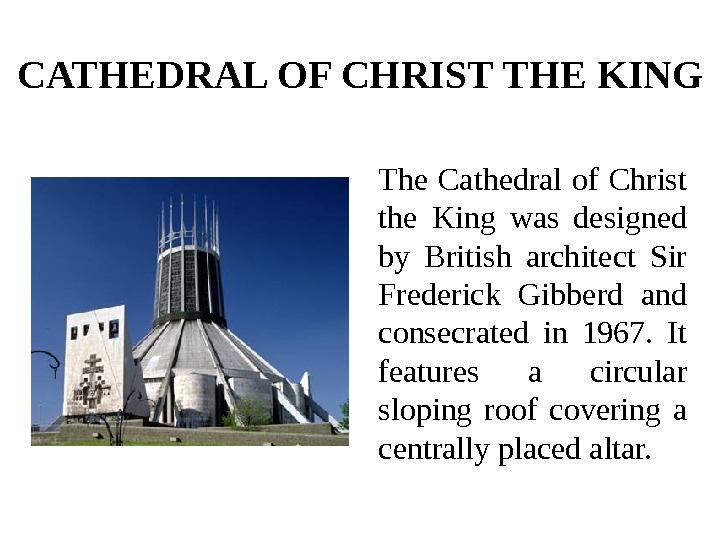
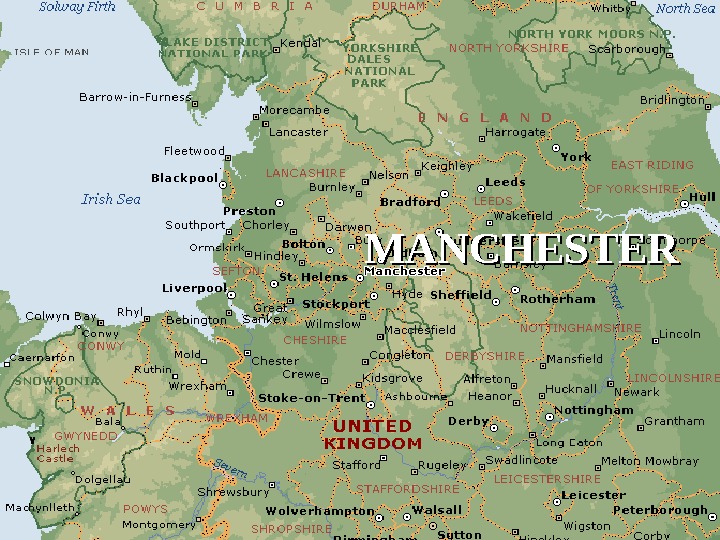

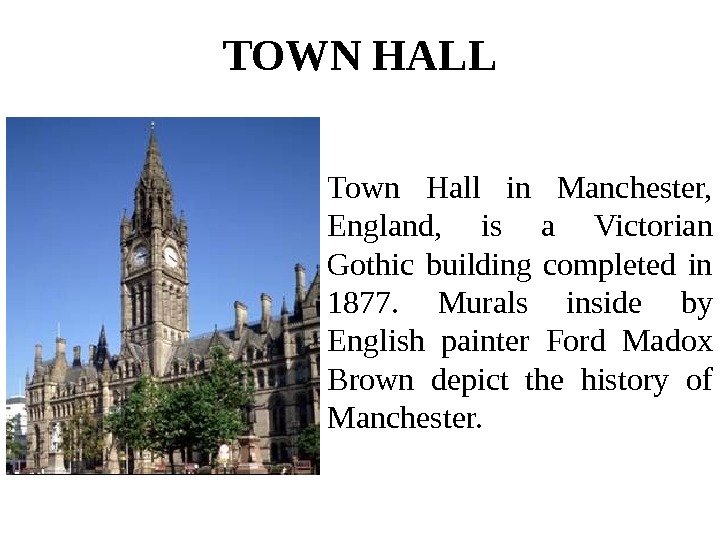

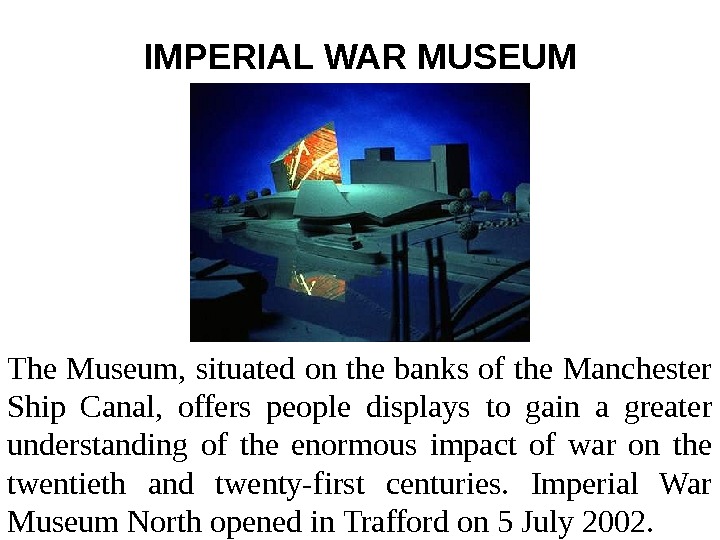
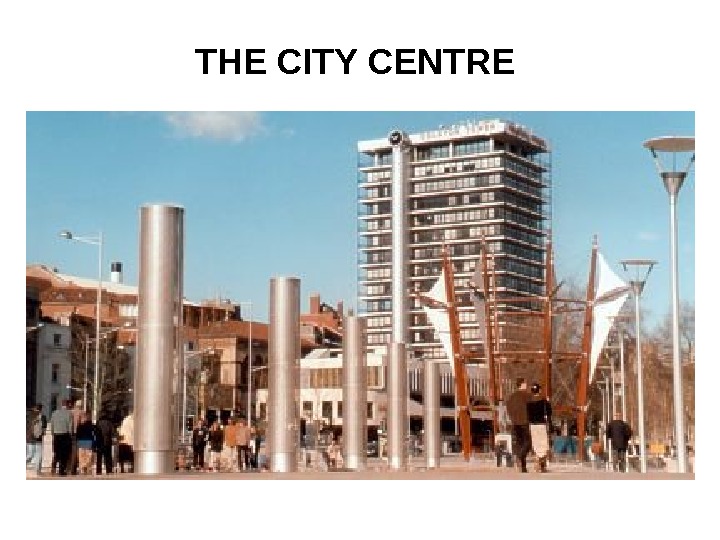
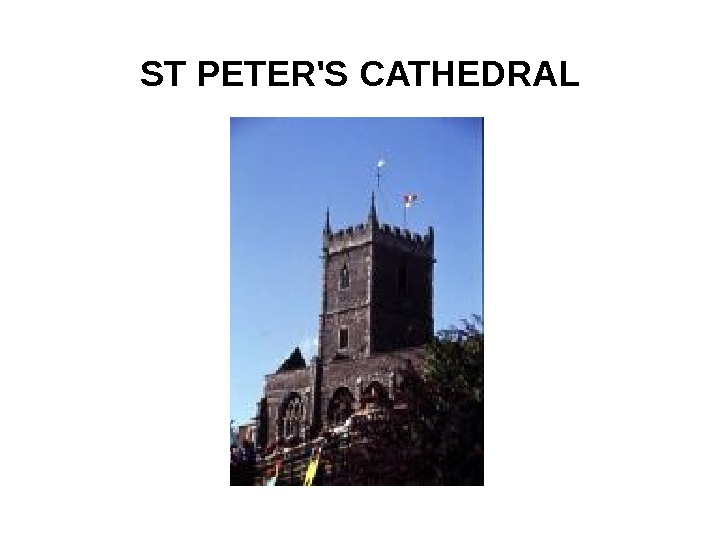
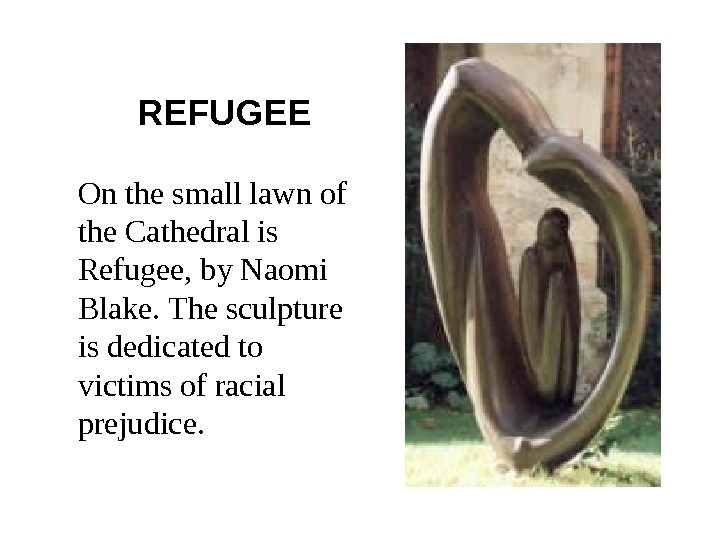




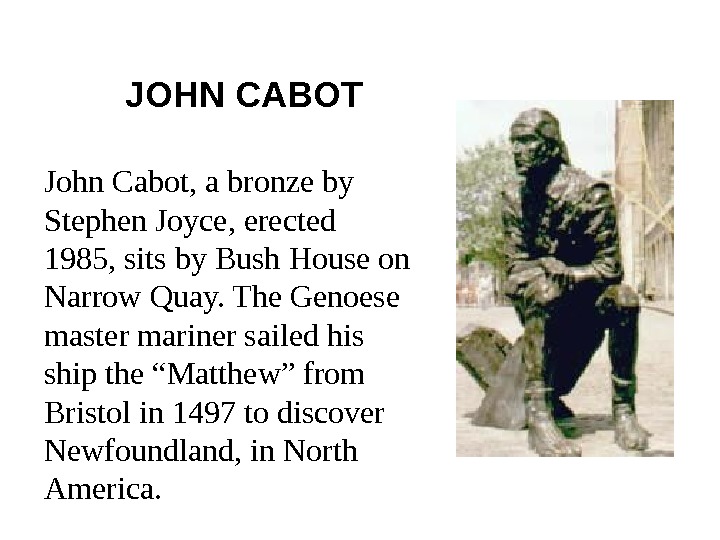

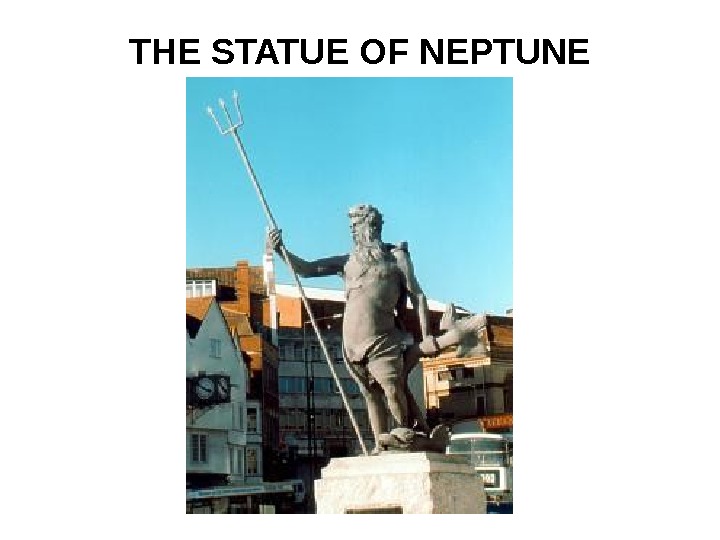
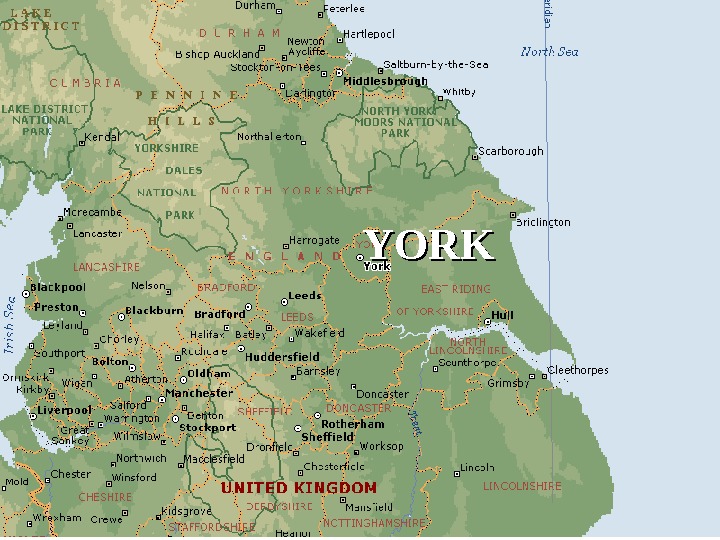
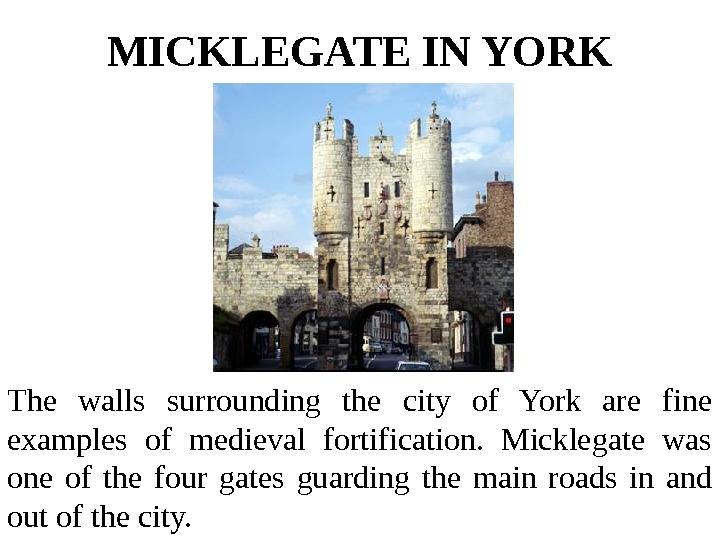

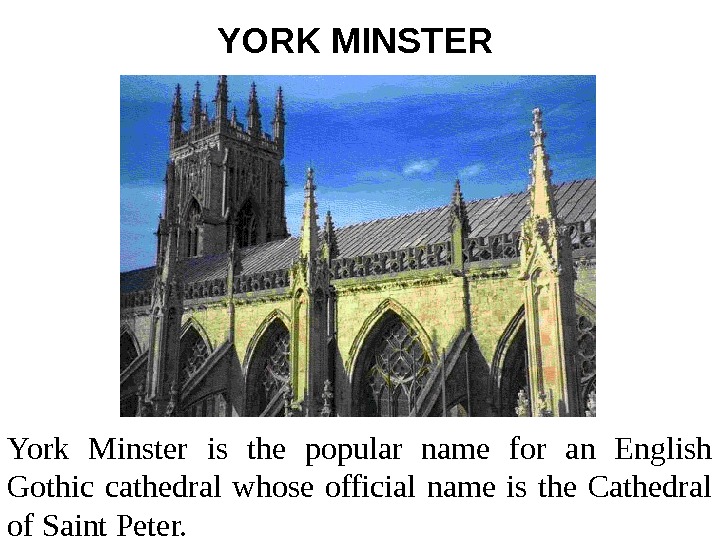
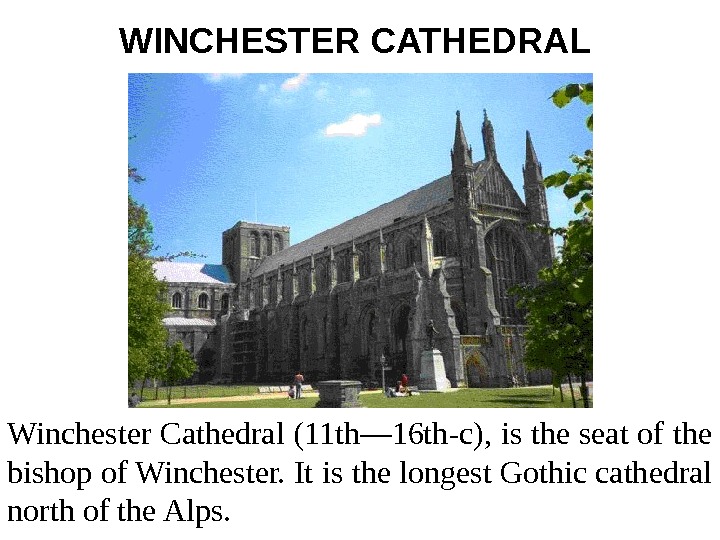

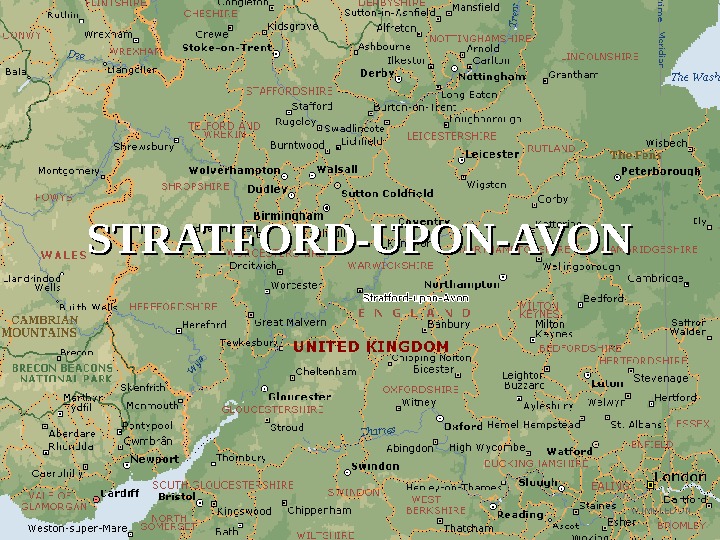
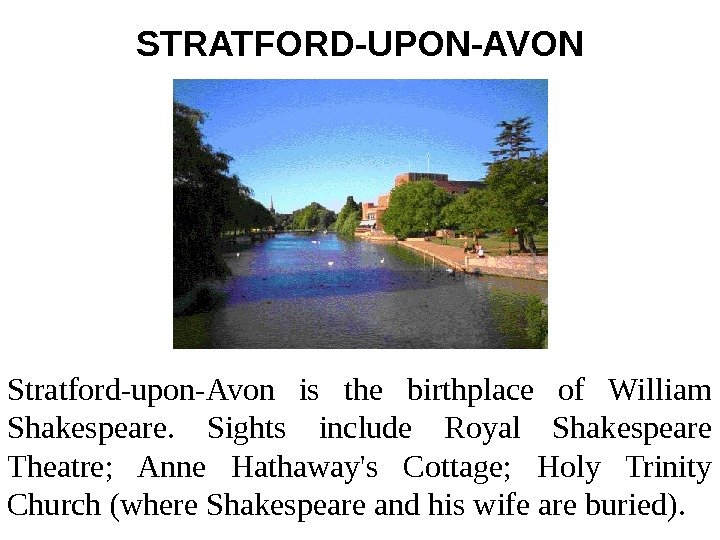
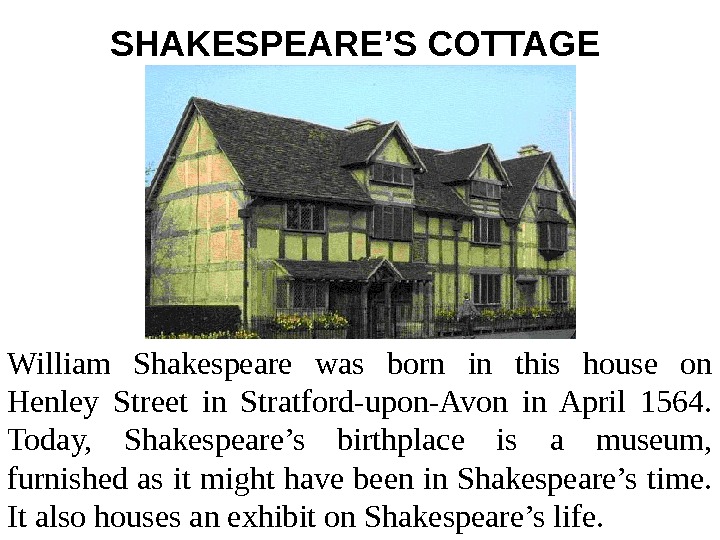
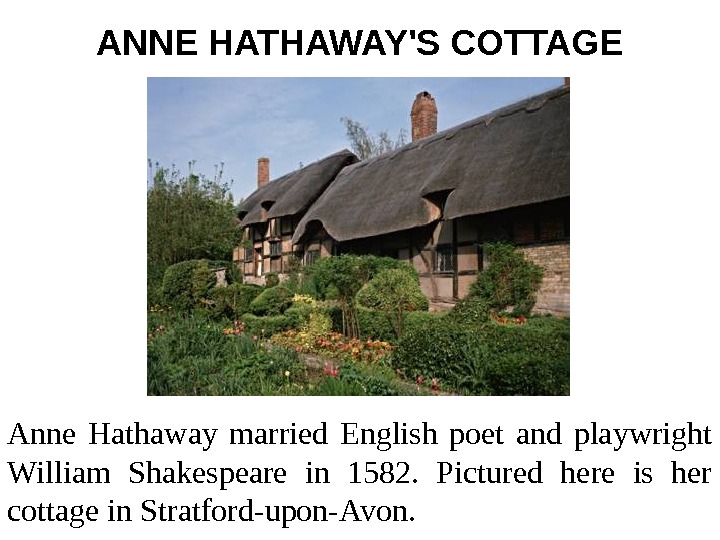


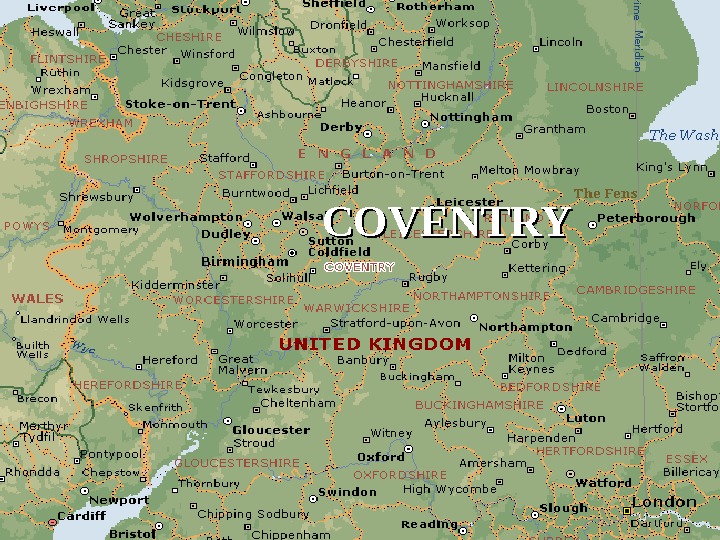
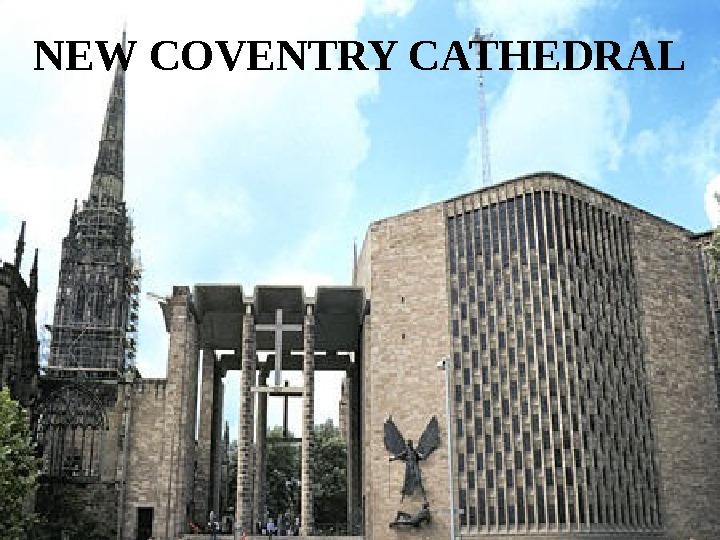
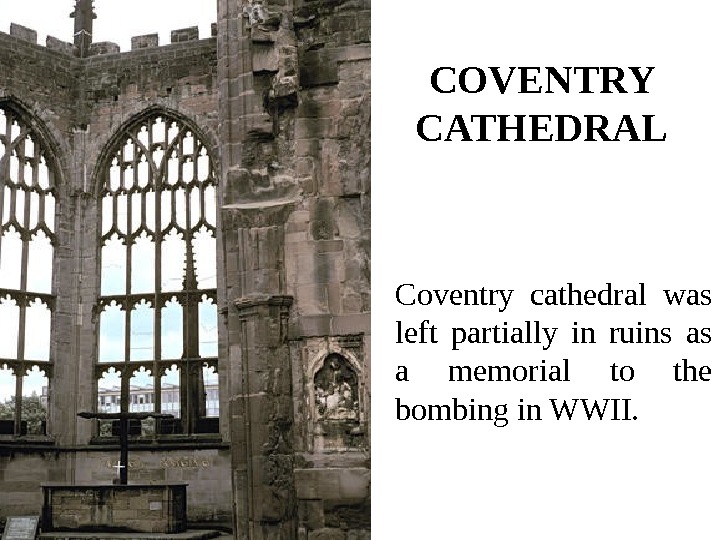
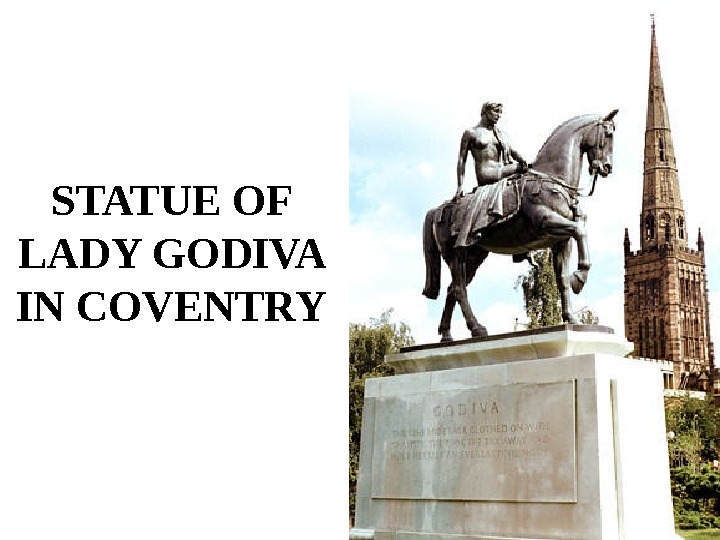
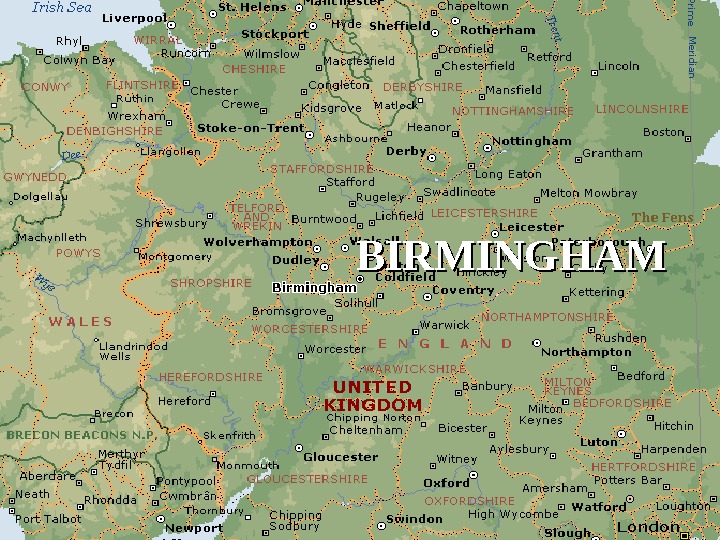
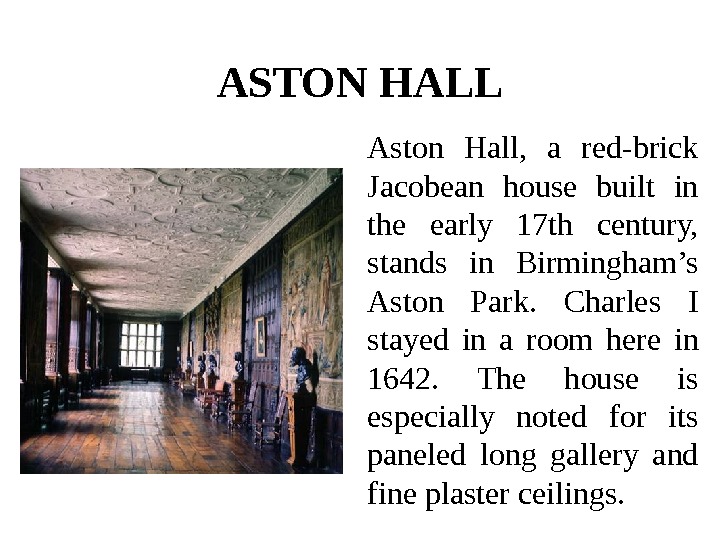
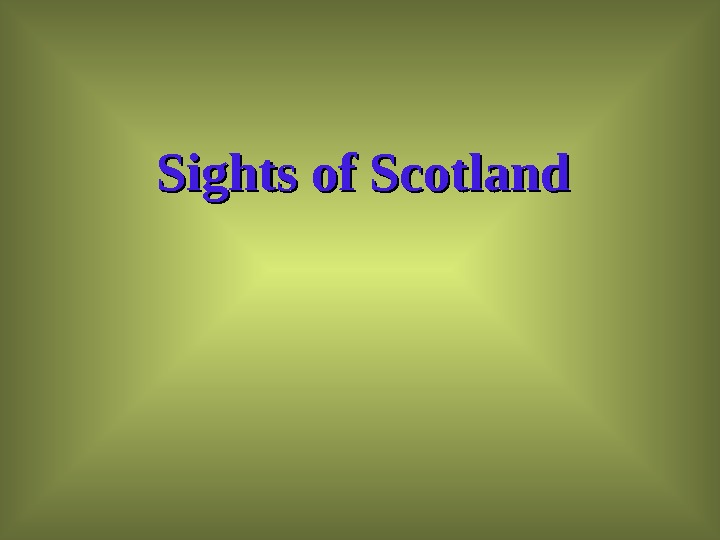
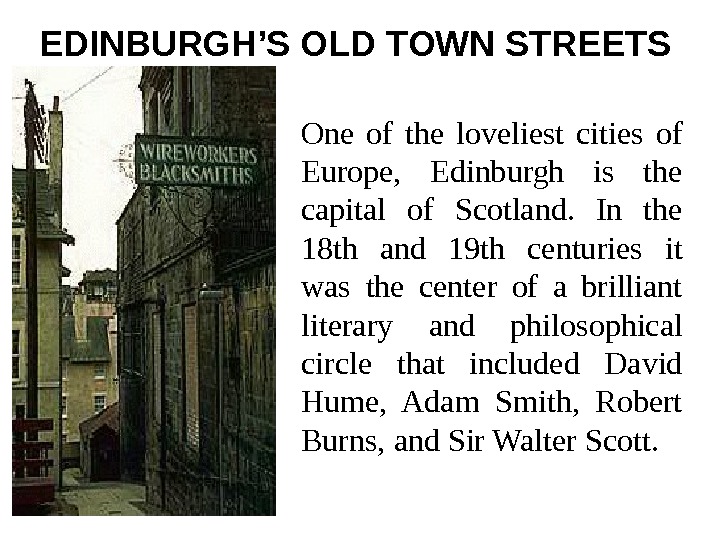
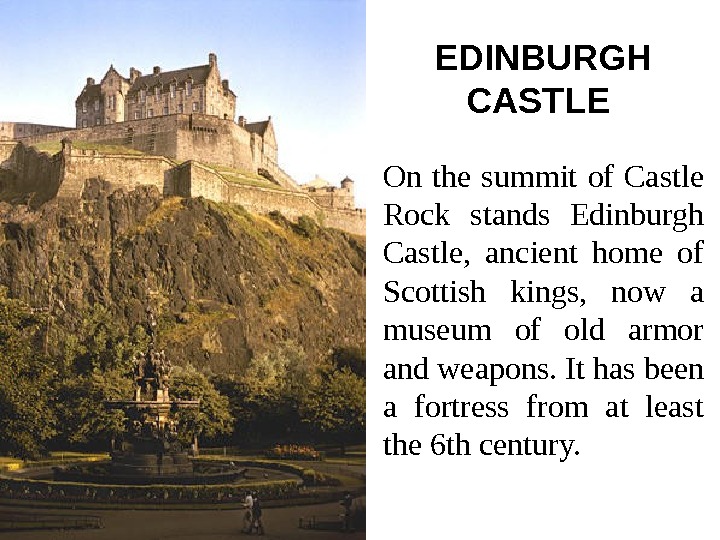
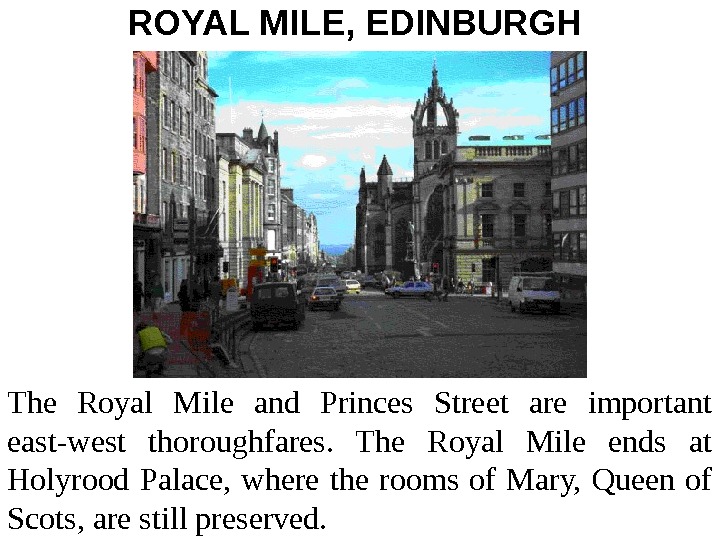
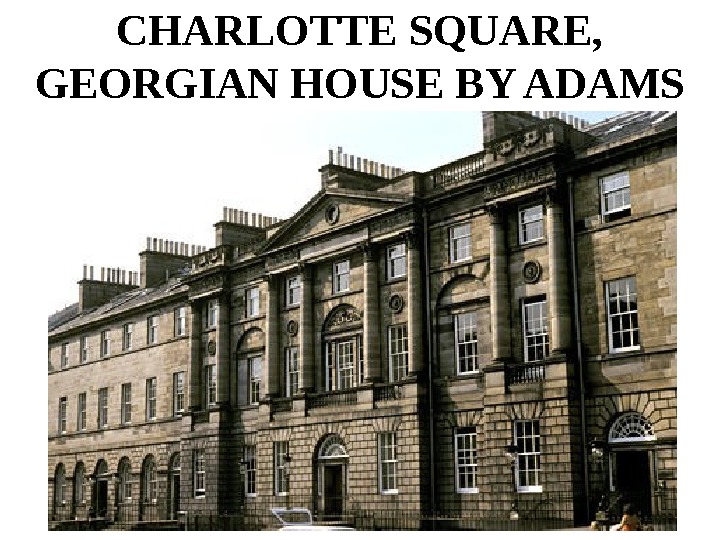
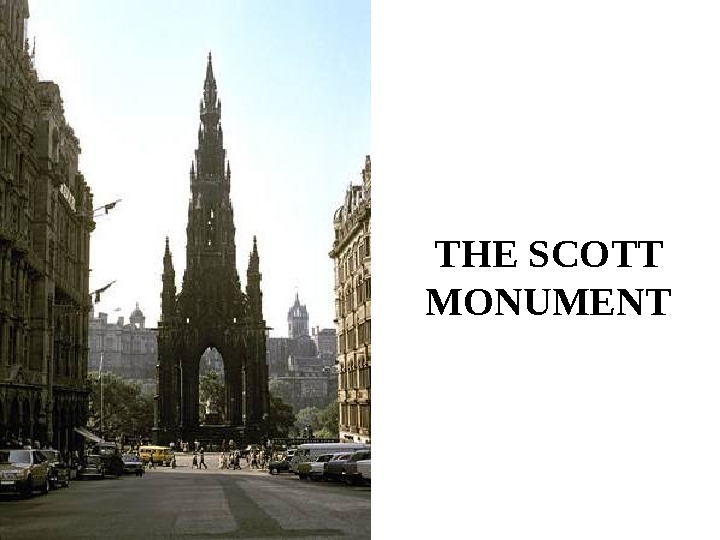
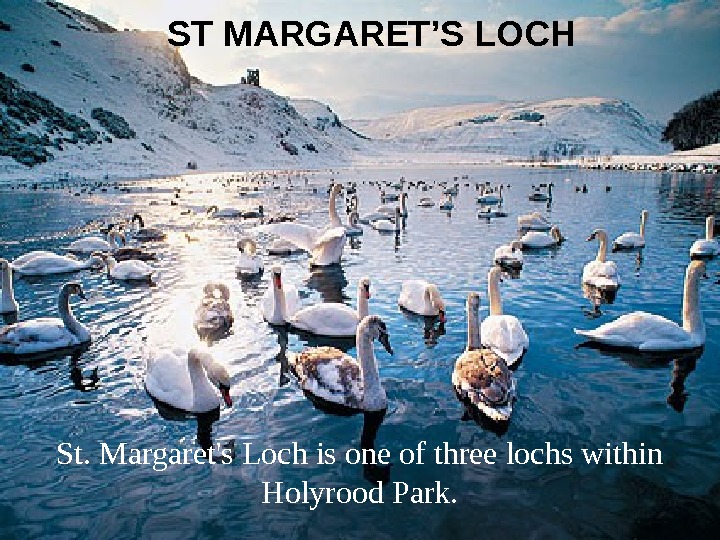
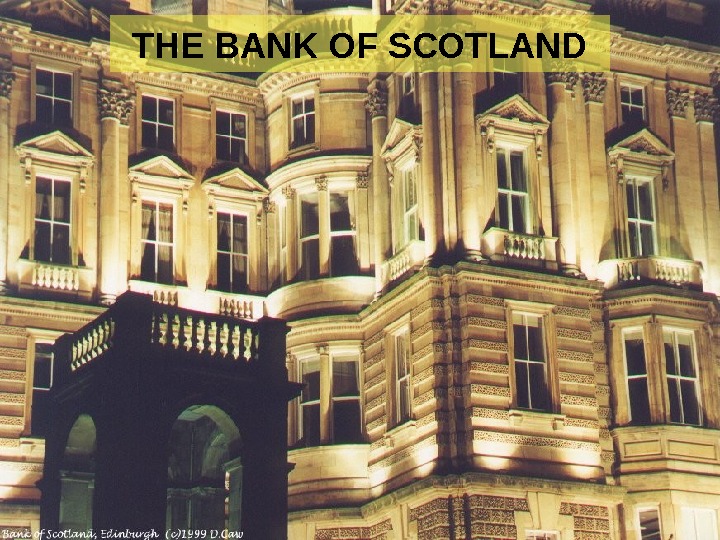
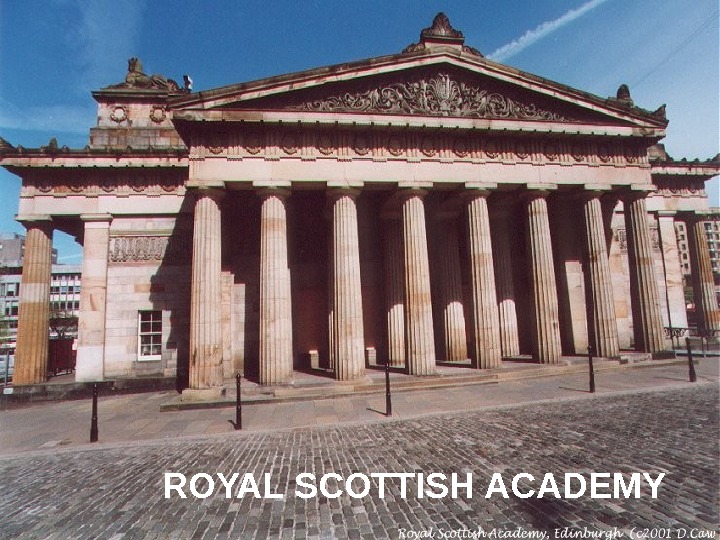


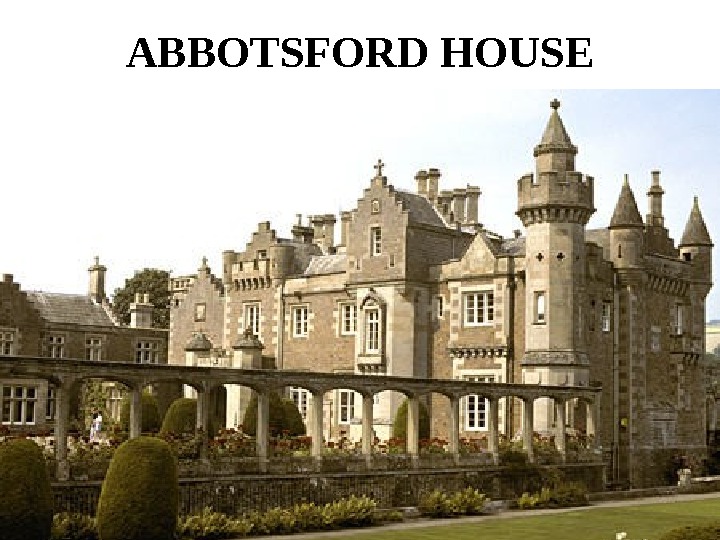

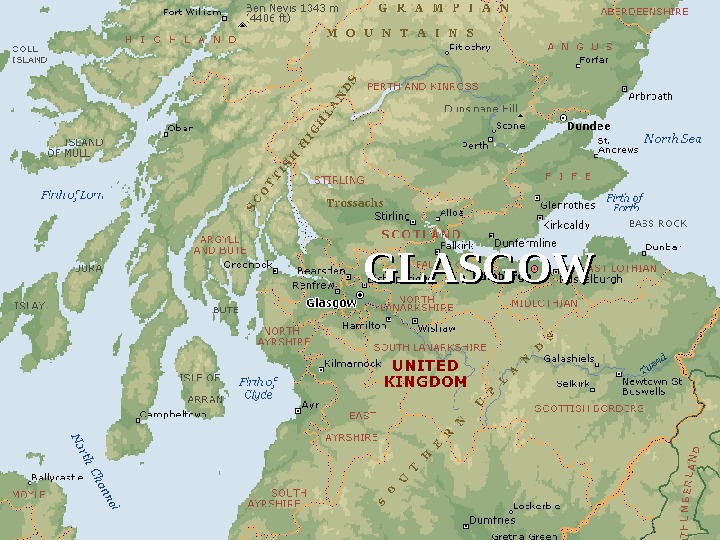

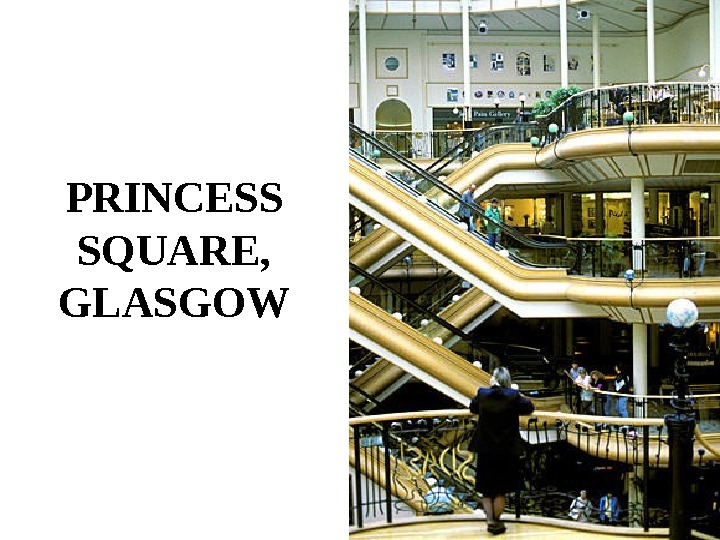
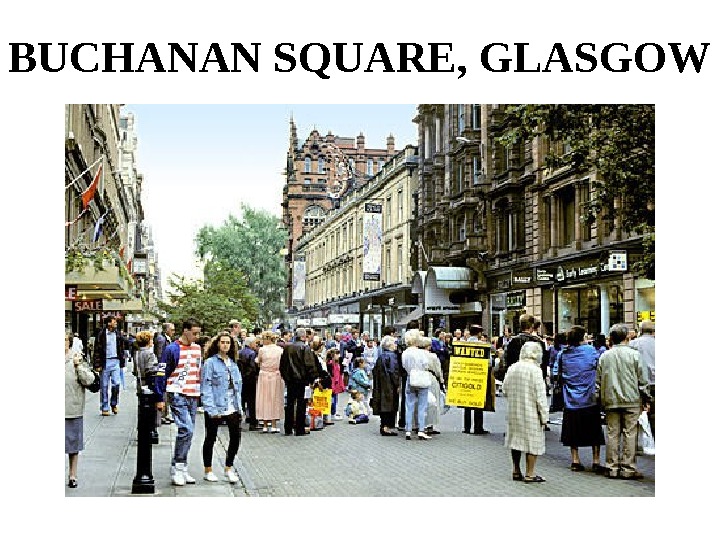

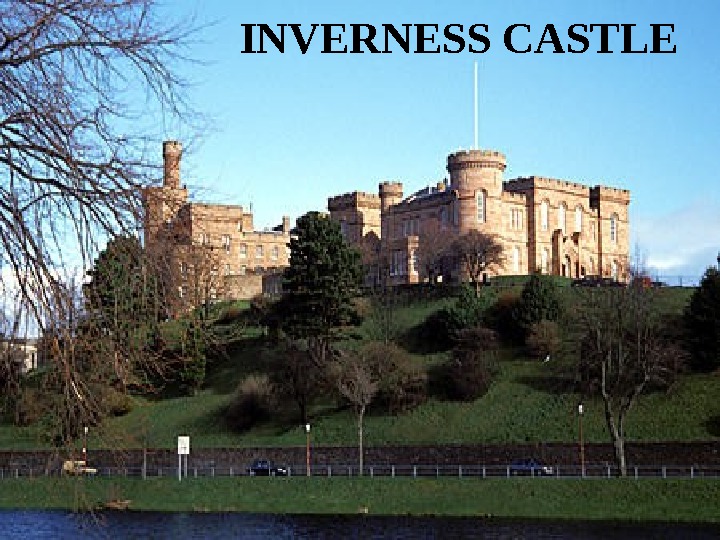
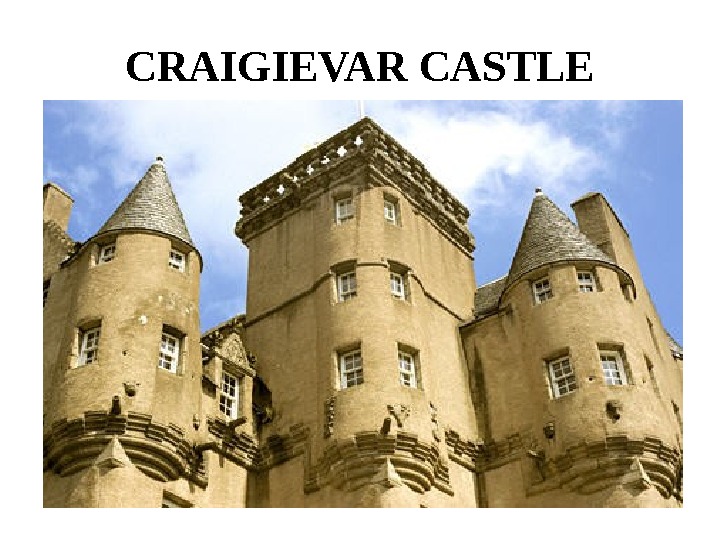
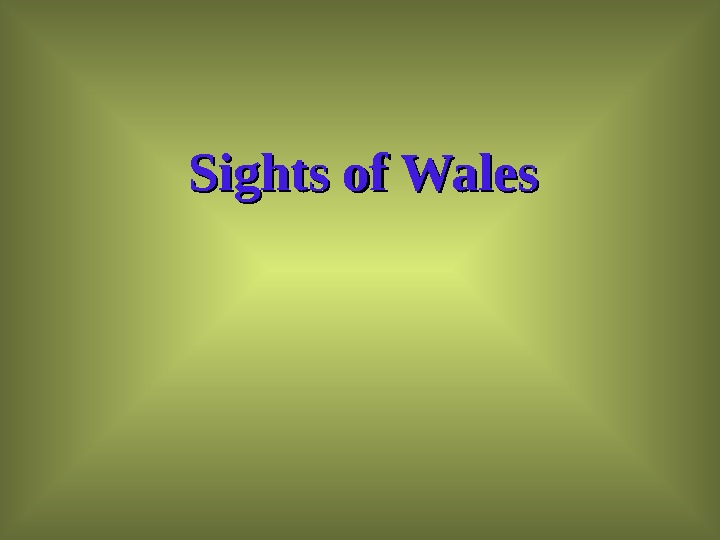
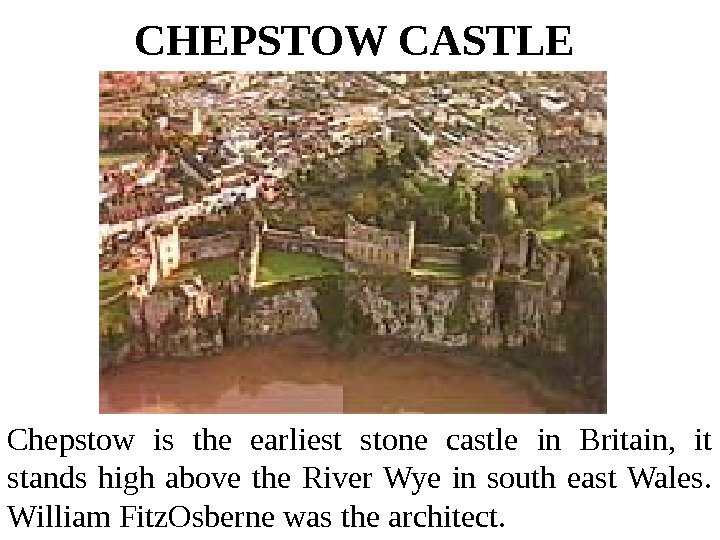
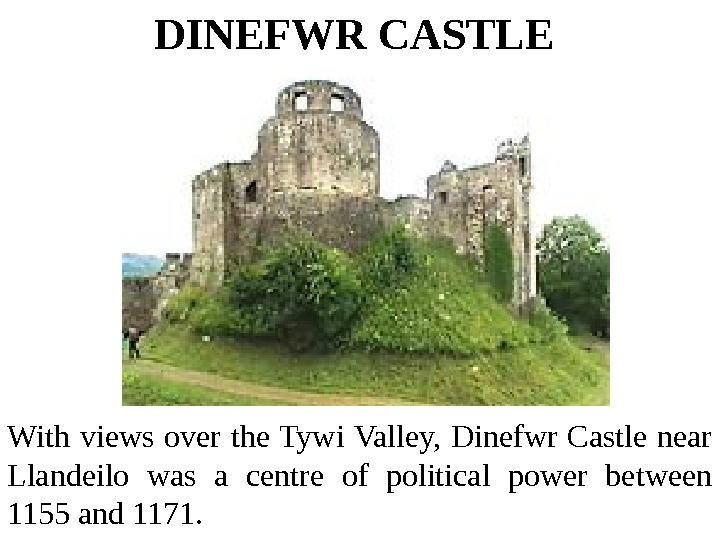
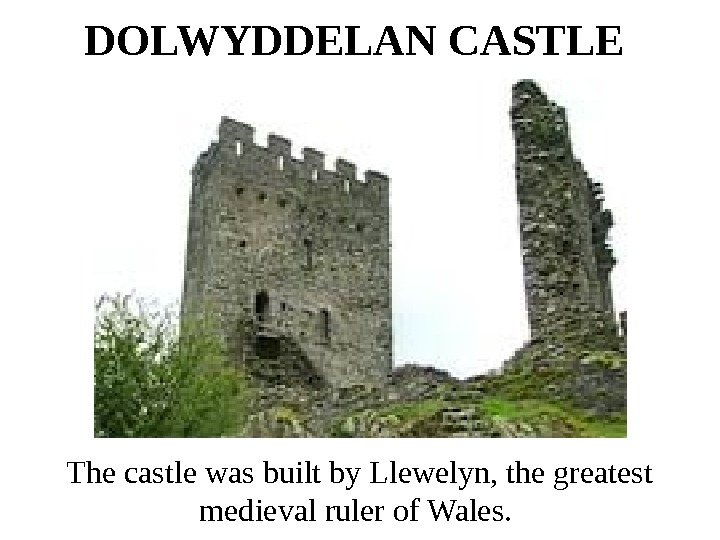
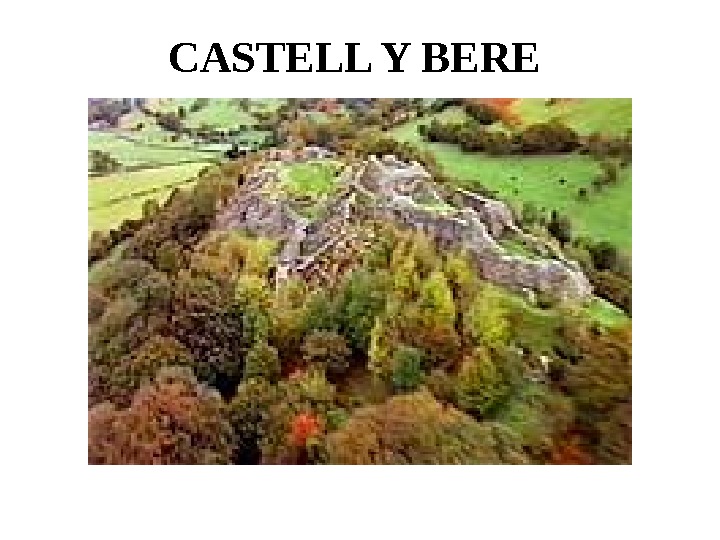
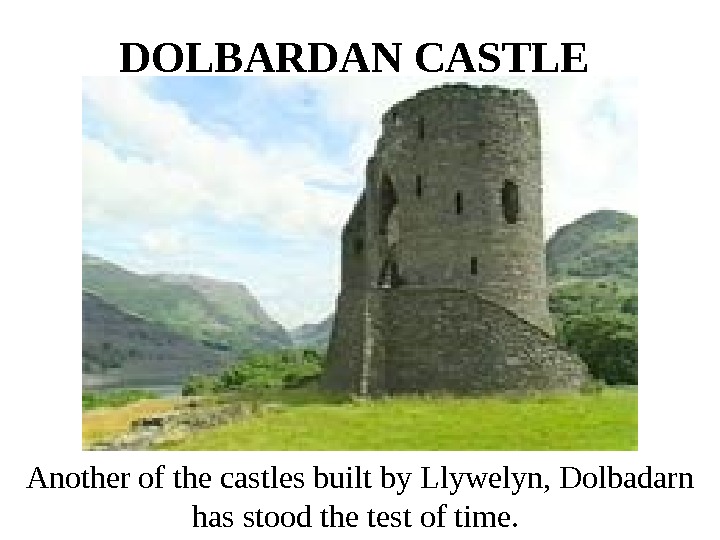
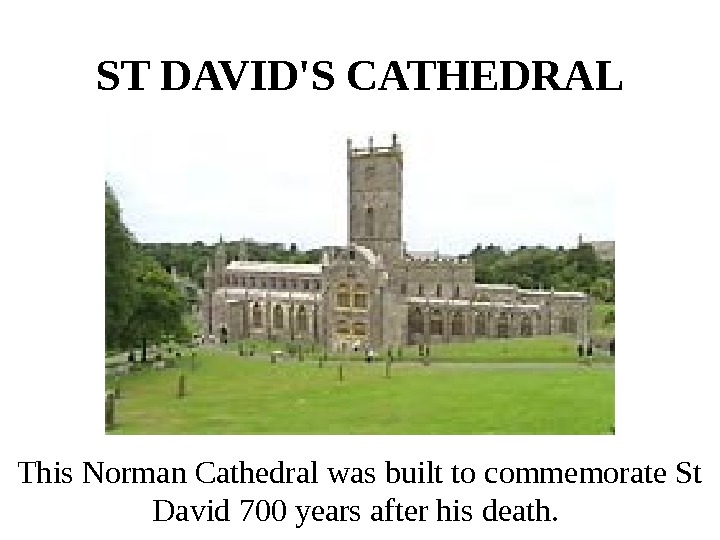
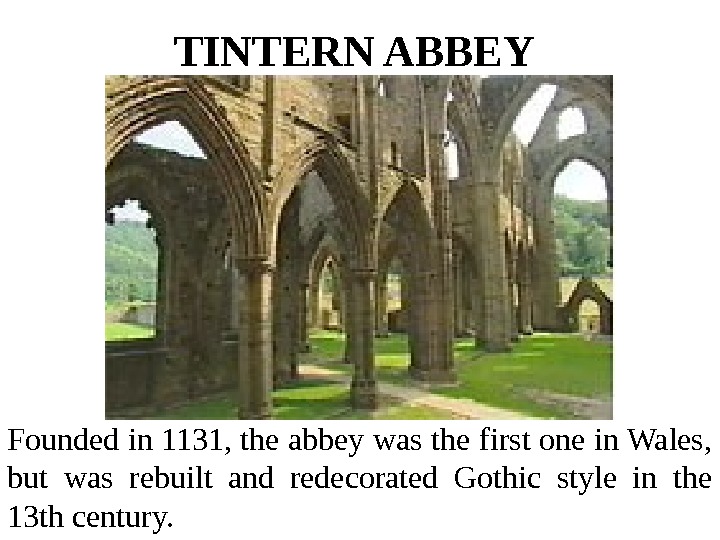
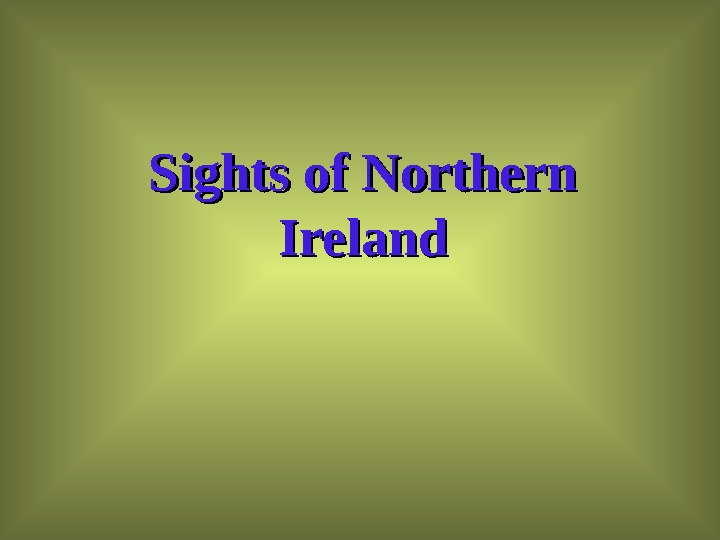
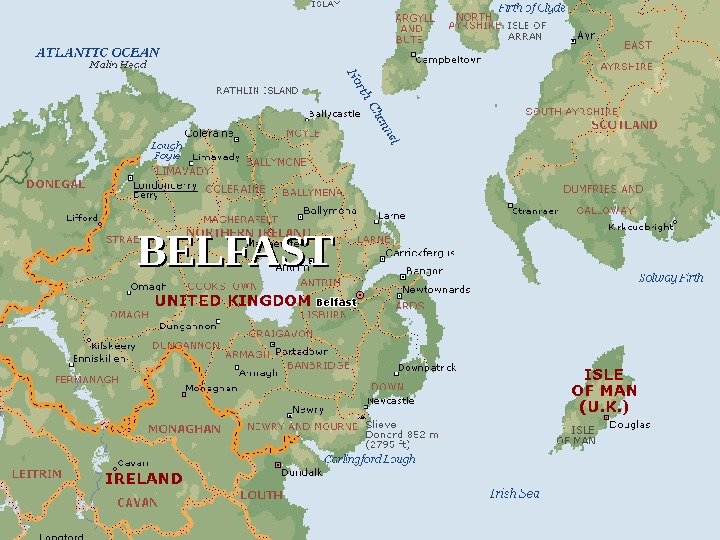

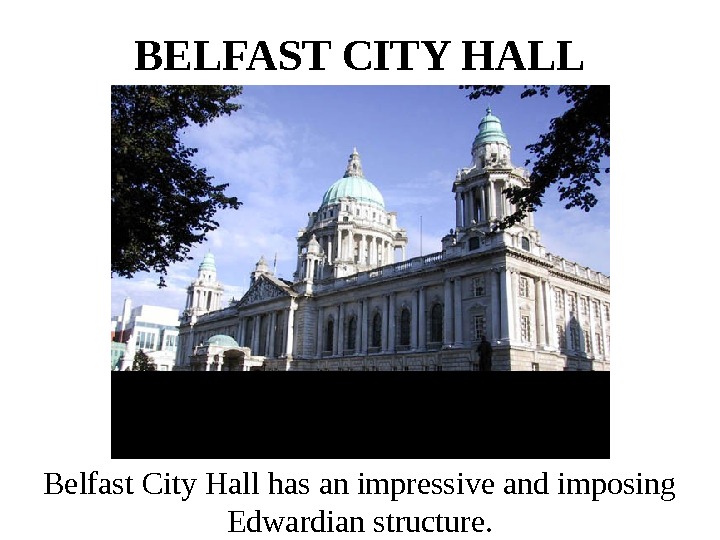
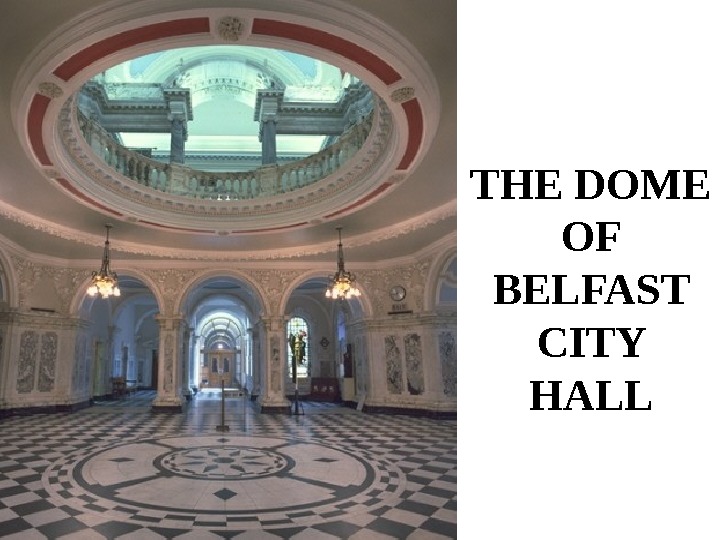
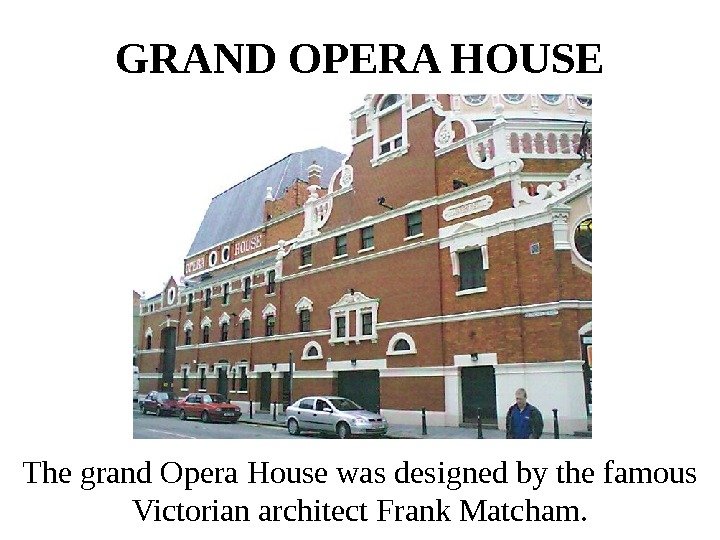
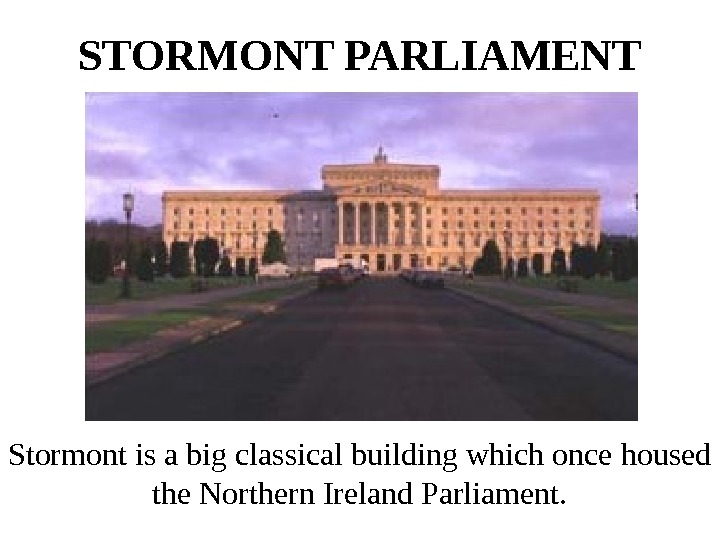
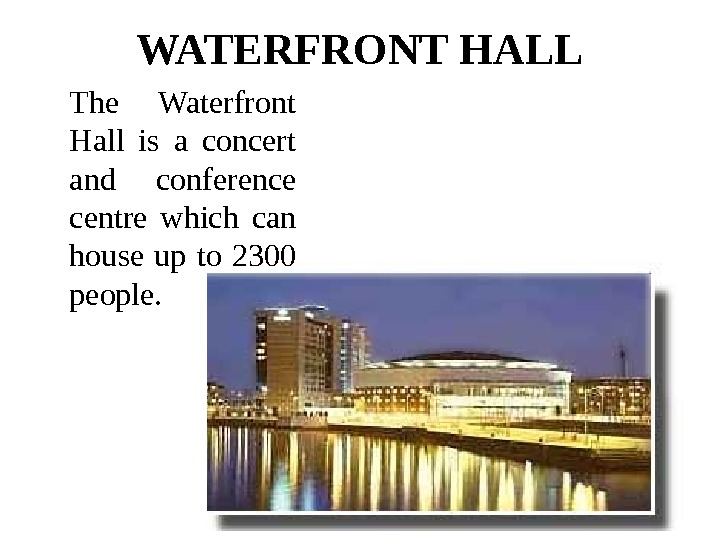


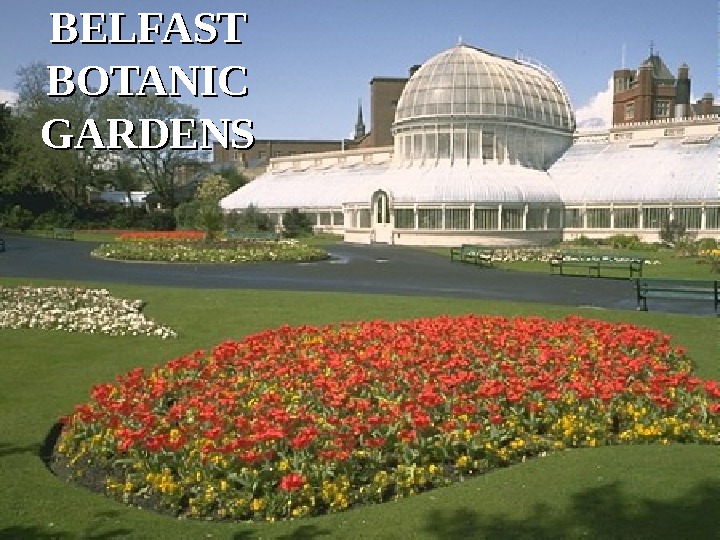
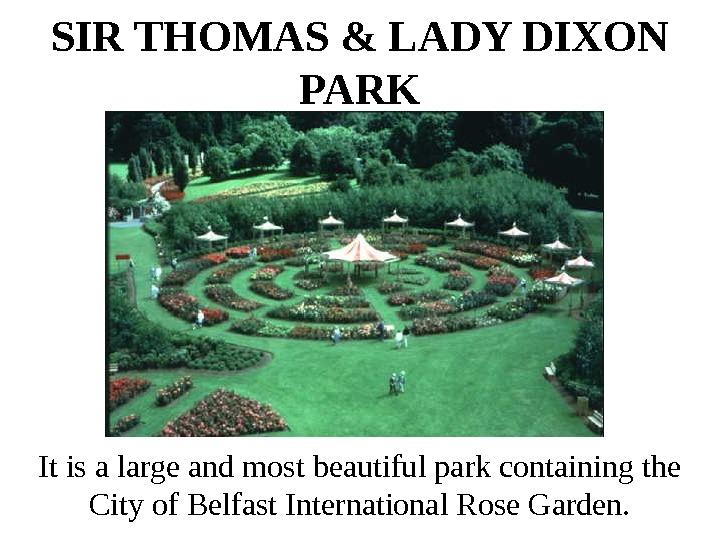
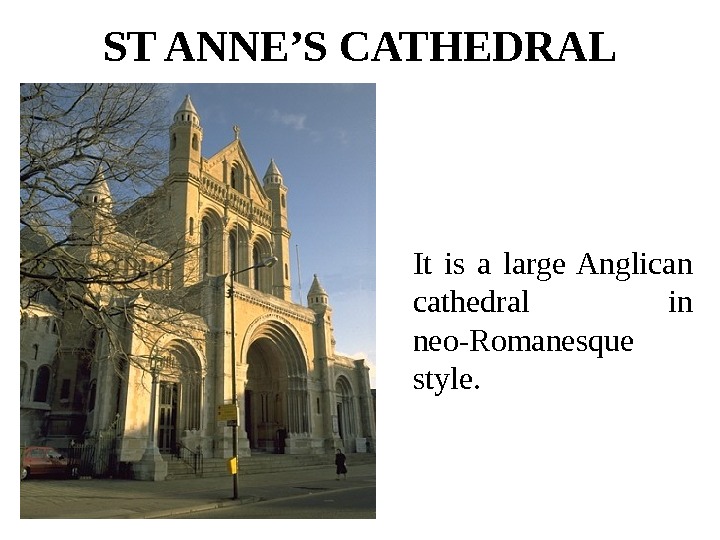
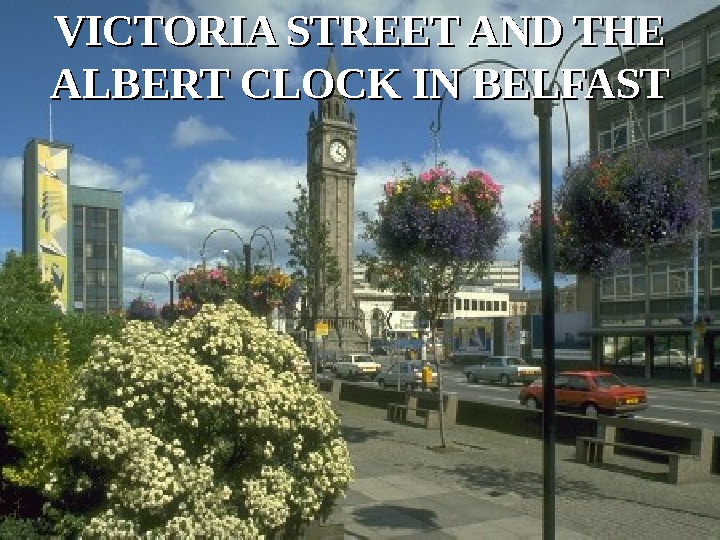
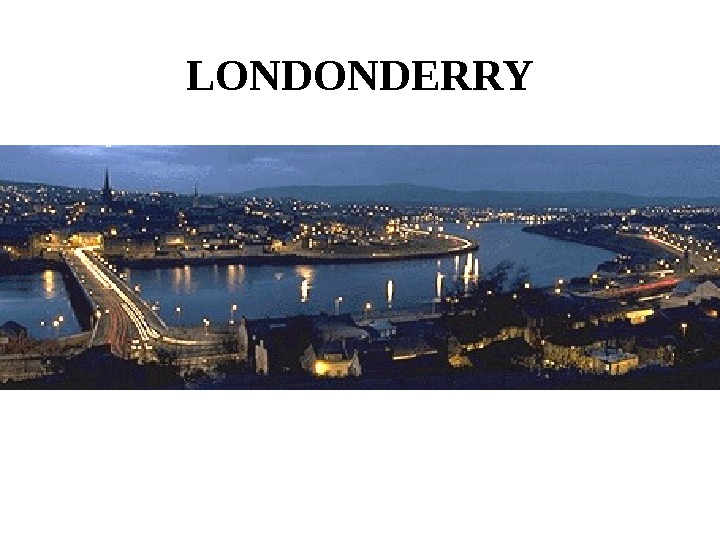
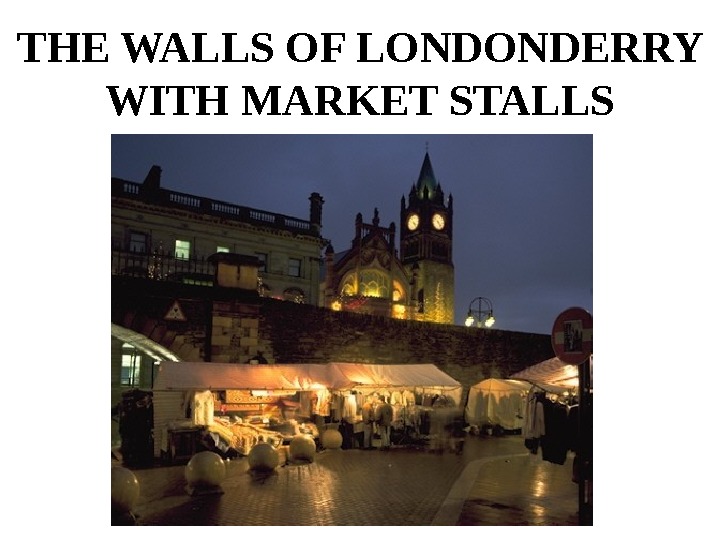



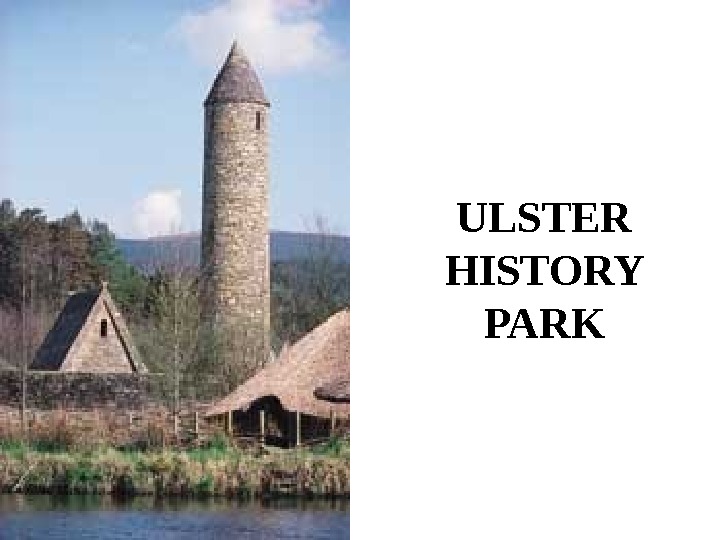
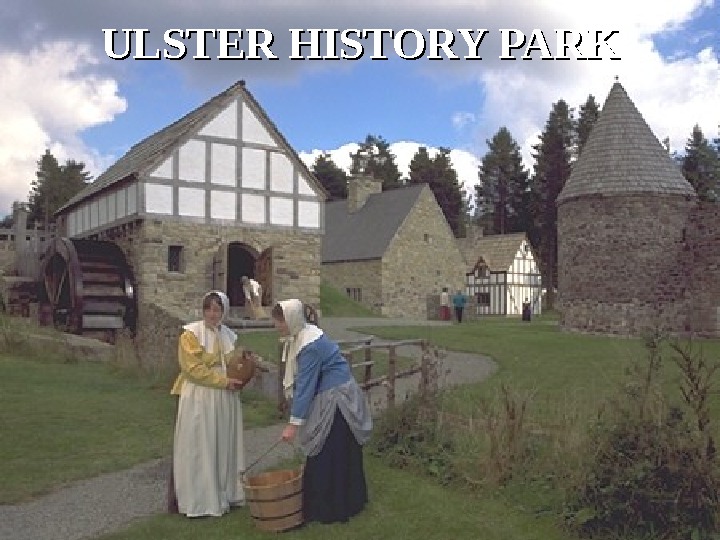
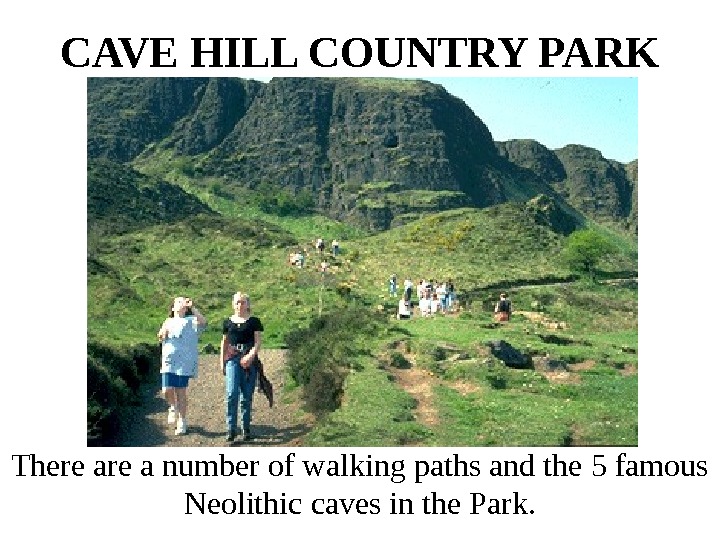
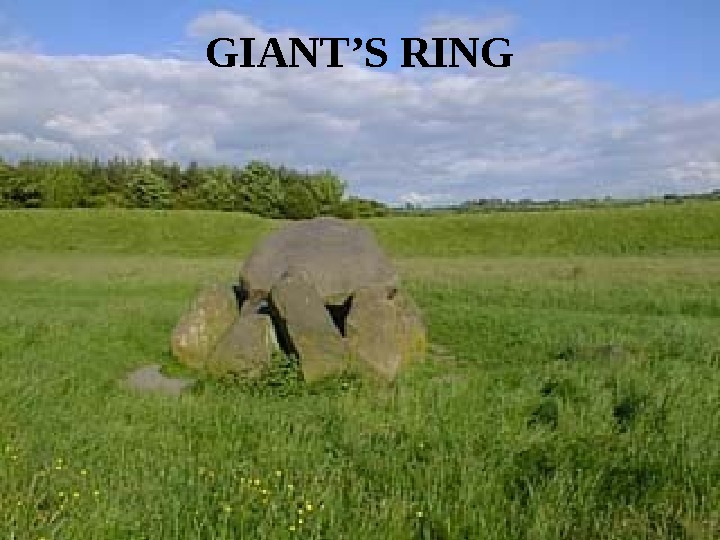
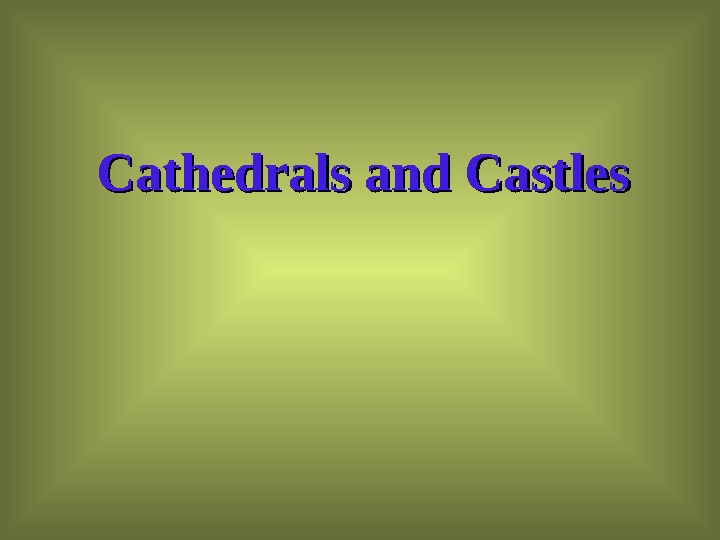
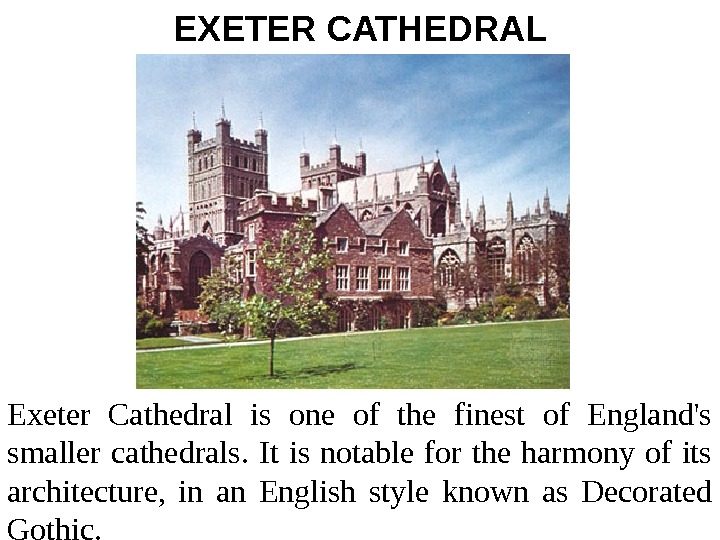

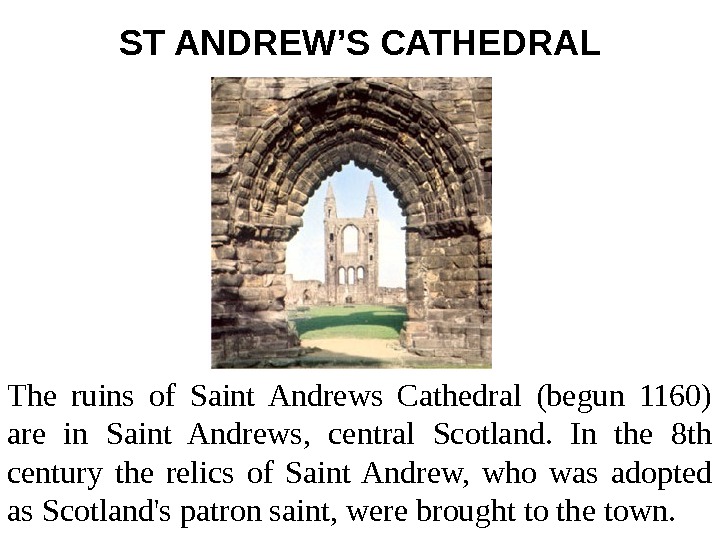
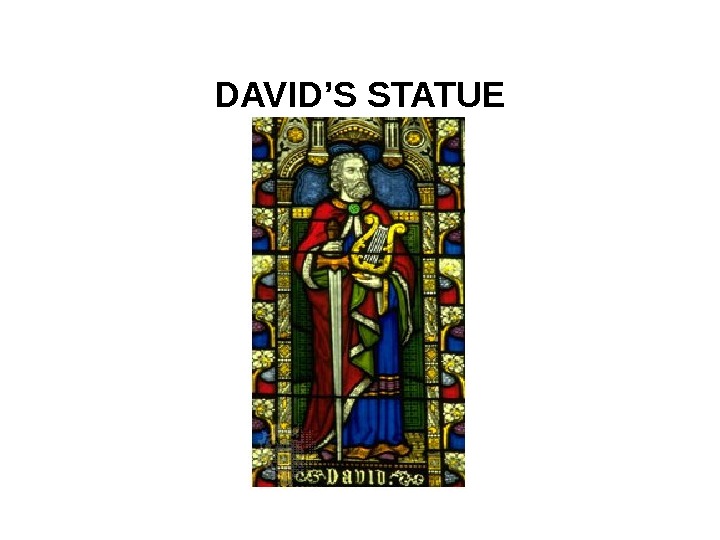
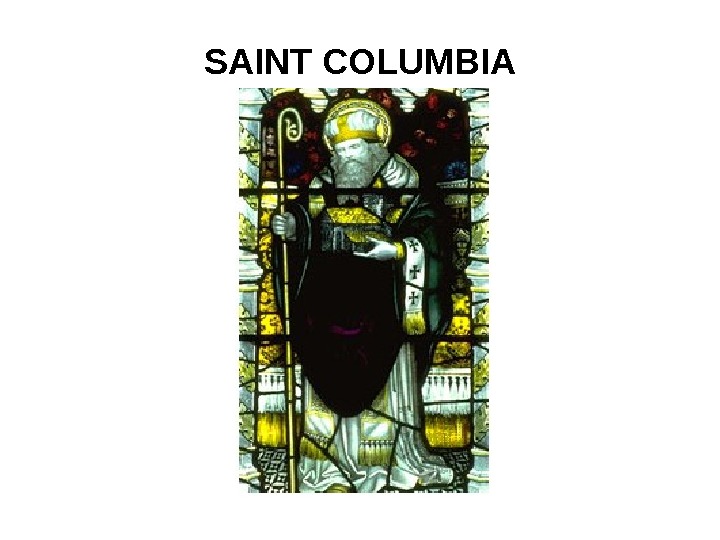

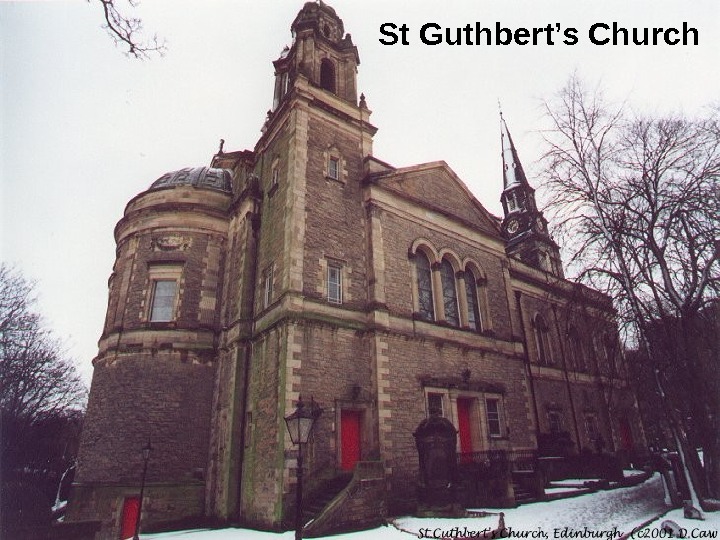
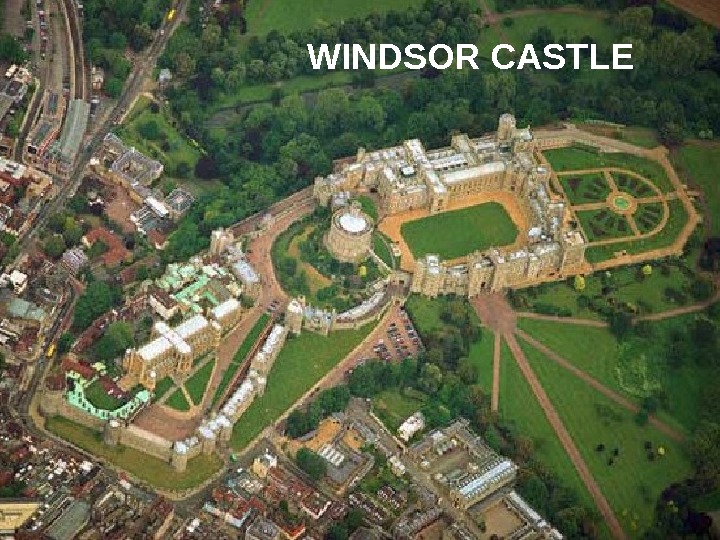
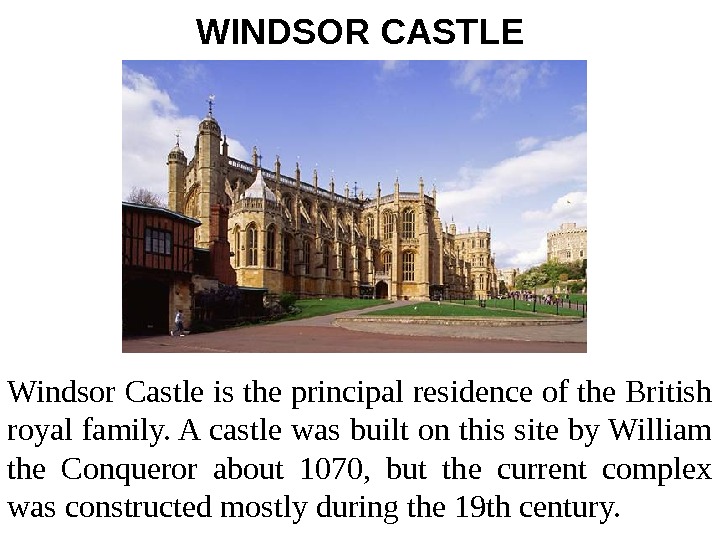

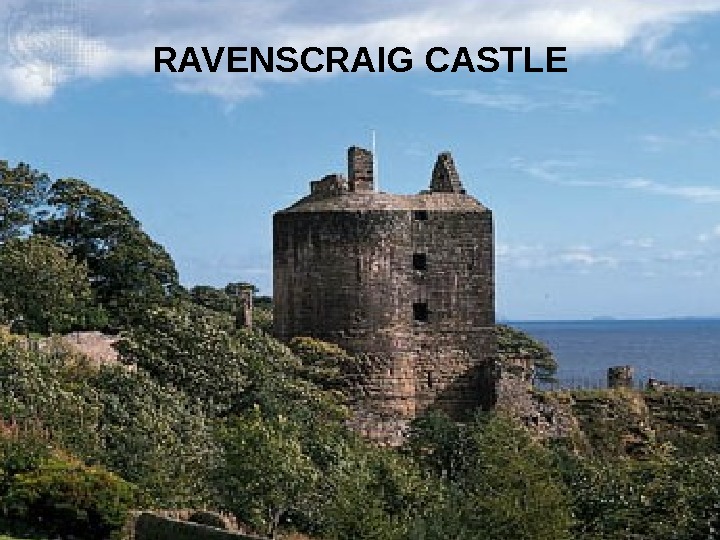
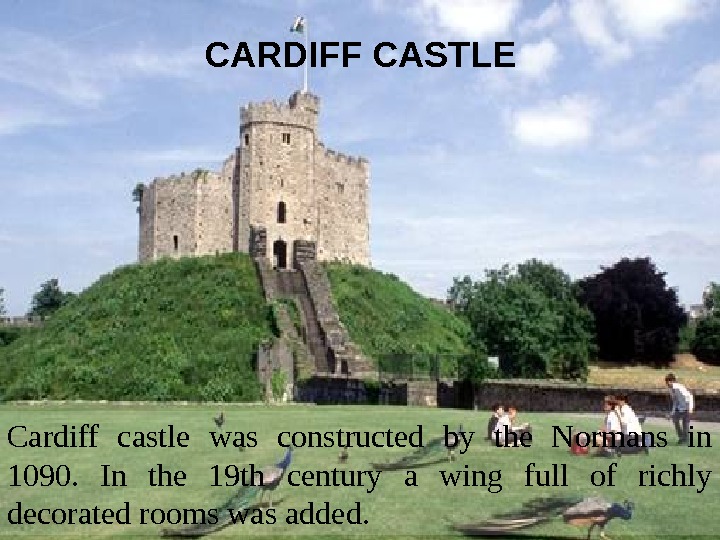
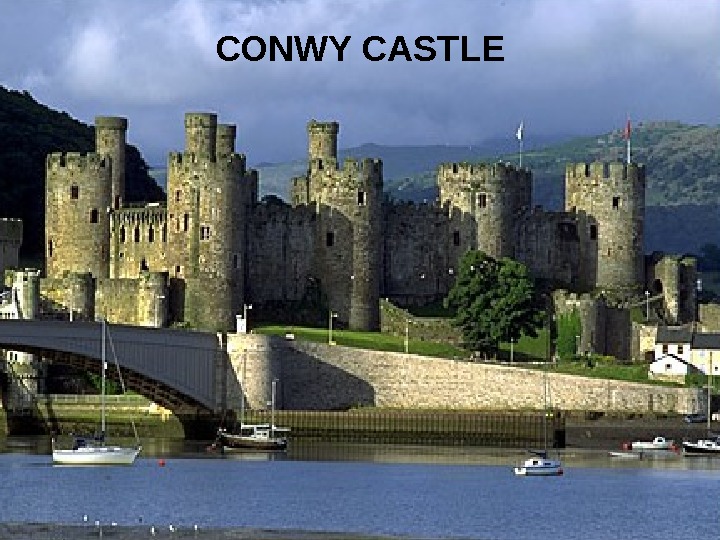
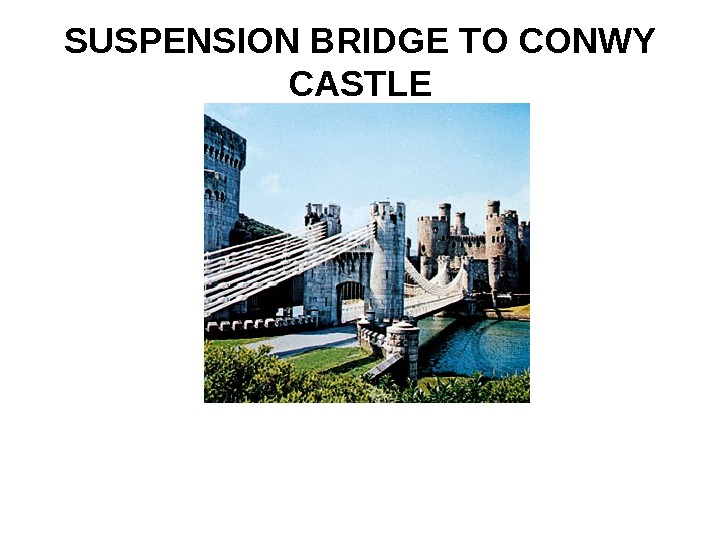
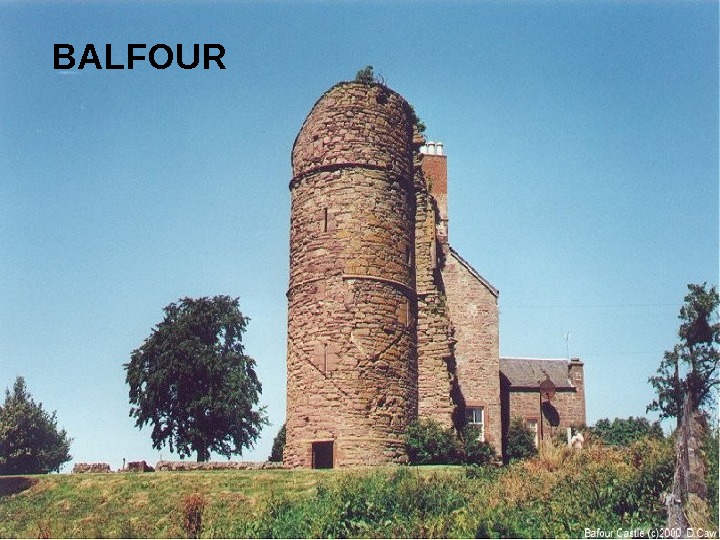
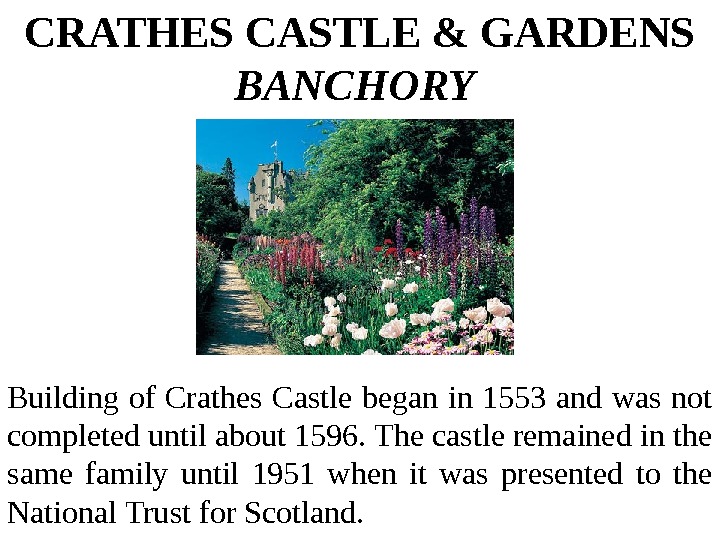
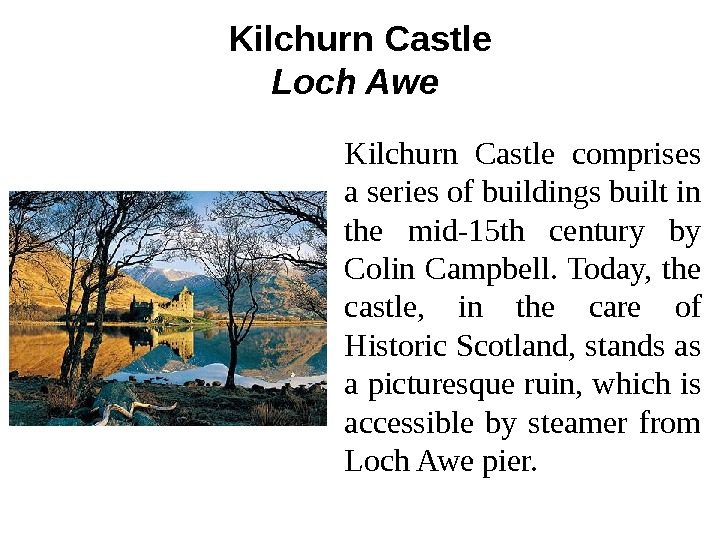
- Размер: 24.6 Mегабайта
- Количество слайдов: 166
Описание презентации Sights Of Great Britain LONDON ST. по слайдам
 Sights Of Great Britain
Sights Of Great Britain
 LONDON
LONDON
 ST. PAUL’S CATHEDRAL Constructed in the form of a Latin cross and dominated by a magnificent dome, St. Paul’s Cathedral is considered the masterpiece of architect Christopher Wren.
ST. PAUL’S CATHEDRAL Constructed in the form of a Latin cross and dominated by a magnificent dome, St. Paul’s Cathedral is considered the masterpiece of architect Christopher Wren.
 HOUSES OF PARLIAMENT The seat of the British government is in London in the Houses of Parliament, officially the New Palace of Westminster. The current building was built in the mid-19 th century and was designed by British architect Sir Charles Barry.
HOUSES OF PARLIAMENT The seat of the British government is in London in the Houses of Parliament, officially the New Palace of Westminster. The current building was built in the mid-19 th century and was designed by British architect Sir Charles Barry.
 WESTMINSTER ABBEY Westminster Abbey was begun in 1245 for King Henry III. The chapel of Henry VII, designed in the Tudor style, was added in 1503.
WESTMINSTER ABBEY Westminster Abbey was begun in 1245 for King Henry III. The chapel of Henry VII, designed in the Tudor style, was added in 1503.
 TOMB OF ELIZABETH I AND MARY I The Latin epitaph on their tomb reads: “Consorts both in throne and grave, here sleep the two sisters, Elizabeth and Mary, in the hope of one resurrection. ”
TOMB OF ELIZABETH I AND MARY I The Latin epitaph on their tomb reads: “Consorts both in throne and grave, here sleep the two sisters, Elizabeth and Mary, in the hope of one resurrection. ”
 TOMB OF THE UNKNOWN WARRIOR The British Empire suffered more than 3 million casualties during World War I (1914 -1918). The Tomb of the Unknown Warrior commemorates those who died during this conflict and is one of the most honored graves in the abbey.
TOMB OF THE UNKNOWN WARRIOR The British Empire suffered more than 3 million casualties during World War I (1914 -1918). The Tomb of the Unknown Warrior commemorates those who died during this conflict and is one of the most honored graves in the abbey.
 PORTRAIT OF RICHARD II A portrait of Richard II (1367 -1400) hangs on the southwest pier of the nave. This painting is believed to be the oldest portrait of an English monarch.
PORTRAIT OF RICHARD II A portrait of Richard II (1367 -1400) hangs on the southwest pier of the nave. This painting is believed to be the oldest portrait of an English monarch.
 SCULPTURE MEMORIAL TO AUSTRALIAN WWI TROOPS IN VICTORIA EMBANKMENT GARDENS
SCULPTURE MEMORIAL TO AUSTRALIAN WWI TROOPS IN VICTORIA EMBANKMENT GARDENS
 BOADICEA STATUE AT WESTMINSTER BRIDG
BOADICEA STATUE AT WESTMINSTER BRIDG
 CROMWELL STATUE BY THE PARLIAMENT BUILDING
CROMWELL STATUE BY THE PARLIAMENT BUILDING
 ALBERT MEMORIAL
ALBERT MEMORIAL
 THE VICTORIA AND ALBERT MUSEUM
THE VICTORIA AND ALBERT MUSEUM
 FLORENCE NIGHTINGALE STATUE, LONDON
FLORENCE NIGHTINGALE STATUE, LONDON
 BIG BEN Big Ben was originally the nickname of the bell in the clock tower of the Houses of Parliament, London, and now by association the clock and its tower. The bell, 2. 7 m in diameter and weighing 13 tonnes, was cast in 1858.
BIG BEN Big Ben was originally the nickname of the bell in the clock tower of the Houses of Parliament, London, and now by association the clock and its tower. The bell, 2. 7 m in diameter and weighing 13 tonnes, was cast in 1858.
 STATUE OF CHURCHILL AND BIG BEN
STATUE OF CHURCHILL AND BIG BEN
 NO. 10 DOWNING STREET The official residence of the British prime minister, where cabinet meetings are often held, is located at No. 10. The term Downing Street is often used to mean the British government.
NO. 10 DOWNING STREET The official residence of the British prime minister, where cabinet meetings are often held, is located at No. 10. The term Downing Street is often used to mean the British government.
 BUCKINGHAM PALACE London residence of the British sovereign; bought in 1761 by George III for his wife and became known as the queen’s house; it was rebuilt in 1825 for George IV. Queen Victoria was the first sovereign to live there.
BUCKINGHAM PALACE London residence of the British sovereign; bought in 1761 by George III for his wife and became known as the queen’s house; it was rebuilt in 1825 for George IV. Queen Victoria was the first sovereign to live there.
 TOWER OF LONDON
TOWER OF LONDON
 CROWN JEWELS The crown jewels of Britain are on display in the Jewel House of the Tower of London.
CROWN JEWELS The crown jewels of Britain are on display in the Jewel House of the Tower of London.
 BRITISH MUSEUM The British Museum is located in the Bloomsbury section of London. It was founded in 1753 by Sir Hans Sloane, a British physician.
BRITISH MUSEUM The British Museum is located in the Bloomsbury section of London. It was founded in 1753 by Sir Hans Sloane, a British physician.
 ROYAL ALBERT HALL The Royal Albert Hall (named for Prince Albert, the husband of Queen Victoria) is one of the city’s principal concert halls. Every summer it is the site of the “Proms, ” a series of classical music concerts.
ROYAL ALBERT HALL The Royal Albert Hall (named for Prince Albert, the husband of Queen Victoria) is one of the city’s principal concert halls. Every summer it is the site of the “Proms, ” a series of classical music concerts.
 SAINT JAMES’S PALACE Saint James’s Palace in London was the monarch’s principal residence from 1608 to 1837. It was built by Henry VIII. Today it is the official residence of Charles, Prince of Wales.
SAINT JAMES’S PALACE Saint James’s Palace in London was the monarch’s principal residence from 1608 to 1837. It was built by Henry VIII. Today it is the official residence of Charles, Prince of Wales.
 OLD BAILEY Old Bailey is a street in the City of London, and, by association, the Central Criminal Court located there. The first courthouse was erected in 1539. The present building dates from 1907; the bronze statue of Justice surmounting its dome is a notable London landmark.
OLD BAILEY Old Bailey is a street in the City of London, and, by association, the Central Criminal Court located there. The first courthouse was erected in 1539. The present building dates from 1907; the bronze statue of Justice surmounting its dome is a notable London landmark.
 TRAFALGAR SQUARE AT DUSK Trafalgar Square is named in honour of the Battle of Trafalgar, (21 October 1805). Fought off Cape Trafalgar, Spain, between the British and Franco-Spanish fleets, the British triumph was marred by the death of Nelson at the moment of victory.
TRAFALGAR SQUARE AT DUSK Trafalgar Square is named in honour of the Battle of Trafalgar, (21 October 1805). Fought off Cape Trafalgar, Spain, between the British and Franco-Spanish fleets, the British triumph was marred by the death of Nelson at the moment of victory.
 NELSON’S COLUMN TRAFALGAR SQUARE Admiral Nelson gained his greatest victory in 1805 against the combined French and Spanish fleet at Trafalgar. During the battle he was mortally wounded on his flagship, HMS Victory. His body was brought home and buried in St Paul’s. The column was erected in 1839.
NELSON’S COLUMN TRAFALGAR SQUARE Admiral Nelson gained his greatest victory in 1805 against the combined French and Spanish fleet at Trafalgar. During the battle he was mortally wounded on his flagship, HMS Victory. His body was brought home and buried in St Paul’s. The column was erected in 1839.
 STATUE OF EROS IN PICCADILLY CIRCUS The famous statue of Eros, the God of Love, stands at the very center of Piccadilly Circus. Eros is a mistaken identity. The sculpture was designed by Sir Alfred Gilbert to top the memorial fountain in memory of the (seventh) Earl of Shaftesbury, the renowned Victorian philanthropist. It portrays not Eros but ‘the Angel of Christian Charity. ’
STATUE OF EROS IN PICCADILLY CIRCUS The famous statue of Eros, the God of Love, stands at the very center of Piccadilly Circus. Eros is a mistaken identity. The sculpture was designed by Sir Alfred Gilbert to top the memorial fountain in memory of the (seventh) Earl of Shaftesbury, the renowned Victorian philanthropist. It portrays not Eros but ‘the Angel of Christian Charity. ’
 TATE GALLERY The Tate Gallery was originally intended to show only British art, but its scope has been widened. It is now the National Gallery of British Paintings and of Modern Foreign Art.
TATE GALLERY The Tate Gallery was originally intended to show only British art, but its scope has been widened. It is now the National Gallery of British Paintings and of Modern Foreign Art.
 BANDSTAND, HYDE PARK Hyde Park is a royal park in central London, England. It was first opened to the public during the reign of James I, and became a popular place for riding for members of fashionable society until the end of World War I. The Albert Memorial, Speaker’s Corner, and Marble Arch are situated in the park.
BANDSTAND, HYDE PARK Hyde Park is a royal park in central London, England. It was first opened to the public during the reign of James I, and became a popular place for riding for members of fashionable society until the end of World War I. The Albert Memorial, Speaker’s Corner, and Marble Arch are situated in the park.
 VICTORIA STATION Victoria Station is London’s second busiest rail terminal. It is located in the Westminster part of London. The original station was built in 1860, but it was rebuilt early in the 20 th century.
VICTORIA STATION Victoria Station is London’s second busiest rail terminal. It is located in the Westminster part of London. The original station was built in 1860, but it was rebuilt early in the 20 th century.
 WINDSOR CASTLE CHANGING OF THE GUARD Windsor Castle is the largest of England’s castles, situated on the River Thames at Windsor. It was founded by William I and first used as a royal residence by Henry I.
WINDSOR CASTLE CHANGING OF THE GUARD Windsor Castle is the largest of England’s castles, situated on the River Thames at Windsor. It was founded by William I and first used as a royal residence by Henry I.
 LINCOLN CATHEDRAL One of the stunning achievements of the English Middle Ages was its Gothic architecture. Lincoln Cathedral was begun shortly after the Norman conquest.
LINCOLN CATHEDRAL One of the stunning achievements of the English Middle Ages was its Gothic architecture. Lincoln Cathedral was begun shortly after the Norman conquest.
 OXFORD UNIVERSITY Oxford University is the oldest university in Britain (founded in the 12 th century). Prestigious university institutions include the Bodleian Library, the Ashmolean Museum, the Sheldonian Theatre (1644 -8), and the Oxford University Press (founded in 1585).
OXFORD UNIVERSITY Oxford University is the oldest university in Britain (founded in the 12 th century). Prestigious university institutions include the Bodleian Library, the Ashmolean Museum, the Sheldonian Theatre (1644 -8), and the Oxford University Press (founded in 1585).
 MAGDALEN COLLEGE Magdalen College was founded in 1458 and was originally established for the study of theology and philosophy.
MAGDALEN COLLEGE Magdalen College was founded in 1458 and was originally established for the study of theology and philosophy.
 SHELDONIAN THEATRE The Sheldonian Theatre was designed by Sir Christopher Wren for the university’s public ceremonies. It can seat up to 1500 people.
SHELDONIAN THEATRE The Sheldonian Theatre was designed by Sir Christopher Wren for the university’s public ceremonies. It can seat up to 1500 people.
 HERTFORD BRIDGE AND COLLEGE Hertford Bridge was designed in the style of the famous Bridge of Sighs in Venice (1913).
HERTFORD BRIDGE AND COLLEGE Hertford Bridge was designed in the style of the famous Bridge of Sighs in Venice (1913).
 EXETER COLLEGE It was founded in 1314 for scholars nominated by the Bishop of Exeter.
EXETER COLLEGE It was founded in 1314 for scholars nominated by the Bishop of Exeter.
 MARTYR’S MEMORIAL The Memorial was erected in 1841 on the spot, where three puritans were executed for their devotion to the Church of England.
MARTYR’S MEMORIAL The Memorial was erected in 1841 on the spot, where three puritans were executed for their devotion to the Church of England.
 RADCLIFFE CAMERA, PART OF BODLEIAN LIBRARY, OXFORD Bodleian Library is the university library and national depository at Oxford. It was founded in 1595 by Sir Thomas Bodley (1545 -1613), who restored the disused 14 th-c library and laid the foundations of its now extensive holdings.
RADCLIFFE CAMERA, PART OF BODLEIAN LIBRARY, OXFORD Bodleian Library is the university library and national depository at Oxford. It was founded in 1595 by Sir Thomas Bodley (1545 -1613), who restored the disused 14 th-c library and laid the foundations of its now extensive holdings.
 KING’S COLLEGE AND KING’S COLLEGE CHAPEL, CAMBRIDGE Cambridge University is the second oldest university in England, after Oxford. Prestigious university institutions include the Fitzwilliam Museum, the Cavendish Laboratory, the Cambridge University Press (founded 1534), and the University Library.
KING’S COLLEGE AND KING’S COLLEGE CHAPEL, CAMBRIDGE Cambridge University is the second oldest university in England, after Oxford. Prestigious university institutions include the Fitzwilliam Museum, the Cavendish Laboratory, the Cambridge University Press (founded 1534), and the University Library.
 CORPUS CHRISTI COLLEGE The College was founded in 1352 by the members of the guilds of Corpus Christi and of the Blessed Virgin Mary.
CORPUS CHRISTI COLLEGE The College was founded in 1352 by the members of the guilds of Corpus Christi and of the Blessed Virgin Mary.
 DOWNING COLLEGE Downing College was founded by Sir George Downing, who also built No. 10 Downing Street.
DOWNING COLLEGE Downing College was founded by Sir George Downing, who also built No. 10 Downing Street.
 THE UNIVERSITY CHURCH OF GREAT ST MARY
THE UNIVERSITY CHURCH OF GREAT ST MARY
 CHURCHILL COLLEGE The College was founded in 1955 to show the “gratitude of the English-speaking people” to the man, who did so much to save Western values and freedoms.
CHURCHILL COLLEGE The College was founded in 1955 to show the “gratitude of the English-speaking people” to the man, who did so much to save Western values and freedoms.
 BLENHEIM PALACE AND GARDENS, OXFORDSHIRE Blenheim Palace is a Baroque palace designed by Vanbrugh, and built (1705 -24) at Woodstock, near Oxford, Oxfordshire. Now it is a world heritage site. The palace, with its estate of 2000 acres, was a gift from the nation to the 1 st Duke of Marlborough after his victories at the Battle of Blenheim.
BLENHEIM PALACE AND GARDENS, OXFORDSHIRE Blenheim Palace is a Baroque palace designed by Vanbrugh, and built (1705 -24) at Woodstock, near Oxford, Oxfordshire. Now it is a world heritage site. The palace, with its estate of 2000 acres, was a gift from the nation to the 1 st Duke of Marlborough after his victories at the Battle of Blenheim.
 SALISBURY CATHEDRAL The Cathedral is an example of English Gothic architecture. It was built between 1220 and 1260.
SALISBURY CATHEDRAL The Cathedral is an example of English Gothic architecture. It was built between 1220 and 1260.
 BRISTOL
BRISTOL
 BRISTOL MONTAGE Cabot Tower, Cathedral, CLIFTON Suspension Bridge, Wills Tower
BRISTOL MONTAGE Cabot Tower, Cathedral, CLIFTON Suspension Bridge, Wills Tower
 BRISTOL Bristol, located on the Lower Avon River has been a thriving port city since the 10 th century. The old docks are now being carefully restored and transformed into arts and recreation centers.
BRISTOL Bristol, located on the Lower Avon River has been a thriving port city since the 10 th century. The old docks are now being carefully restored and transformed into arts and recreation centers.
 CITY MUSEUM AND ART GALLERY, BRISTOL
CITY MUSEUM AND ART GALLERY, BRISTOL
 STATUE OF RAJAH RAMMOHUN ROY IN FRONT OF BRISTOL CATHEDRAL
STATUE OF RAJAH RAMMOHUN ROY IN FRONT OF BRISTOL CATHEDRAL
 ST MARY REDCLIFFE CHURCH IN BRISTOL
ST MARY REDCLIFFE CHURCH IN BRISTOL
 STAINED GLASS FROM ST MARY REDCLI
STAINED GLASS FROM ST MARY REDCLI
 BATH ABBEY, BATH, AVON Bath is a spa town in south-west England, on the River Avon. It is noted since Roman times for its hot springs.
BATH ABBEY, BATH, AVON Bath is a spa town in south-west England, on the River Avon. It is noted since Roman times for its hot springs.
 PUTTENEY BRIDGE IN BATH
PUTTENEY BRIDGE IN BATH
 THE CIRCUS IN BATH
THE CIRCUS IN BATH
 THE ROMAN BATHS
THE ROMAN BATHS
 TEMPERANCE FOUNTAIN
TEMPERANCE FOUNTAIN
 KING ARTHUR’S CASTLE RUINS IN CORNWALL, ENGLAND King Arthur is a semi-legendary king of the Britons. According to legend, Arthur was raised unaware of his royal ancestry and became king by pulling a sword from a stone.
KING ARTHUR’S CASTLE RUINS IN CORNWALL, ENGLAND King Arthur is a semi-legendary king of the Britons. According to legend, Arthur was raised unaware of his royal ancestry and became king by pulling a sword from a stone.
 SITE OF KING ARTHUR’S TOMB King Arthur is said to have fought against the invaders in a series of momentous battles. He was buried at Glastonbury.
SITE OF KING ARTHUR’S TOMB King Arthur is said to have fought against the invaders in a series of momentous battles. He was buried at Glastonbury.
 RUINS OF FOUNTAINS ABBEY, YORKSHIRE Fountains Abbey is a Cistercian monastery founded in 1132 near Ripon, North Yorkshire. The abbey ruins stand in the magnificent water gardens of Studley Royal, which were laid out in the early 18 th century.
RUINS OF FOUNTAINS ABBEY, YORKSHIRE Fountains Abbey is a Cistercian monastery founded in 1132 near Ripon, North Yorkshire. The abbey ruins stand in the magnificent water gardens of Studley Royal, which were laid out in the early 18 th century.
 LIVERPOOL
LIVERPOOL
 ANGLICAN CATHEDRAL Anglican Cathedral in Liverpool, England, was designed by British architect Sir Giles Gilbert Scott and completed in 1978. The massive red sandstone church is the largest Anglican cathedral in the world.
ANGLICAN CATHEDRAL Anglican Cathedral in Liverpool, England, was designed by British architect Sir Giles Gilbert Scott and completed in 1978. The massive red sandstone church is the largest Anglican cathedral in the world.
 CATHEDRAL OF CHRIST THE KING The Cathedral of Christ the King was designed by British architect Sir Frederick Gibberd and consecrated in 1967. It features a circular sloping roof covering a centrally placed altar.
CATHEDRAL OF CHRIST THE KING The Cathedral of Christ the King was designed by British architect Sir Frederick Gibberd and consecrated in 1967. It features a circular sloping roof covering a centrally placed altar.
 MANCHESTER
MANCHESTER
 MANCHESTER
MANCHESTER
 TOWN HALL Town Hall in Manchester, England, is a Victorian Gothic building completed in 1877. Murals inside by English painter Ford Madox Brown depict the history of Manchester.
TOWN HALL Town Hall in Manchester, England, is a Victorian Gothic building completed in 1877. Murals inside by English painter Ford Madox Brown depict the history of Manchester.
 The Lowry includes art galleries a theatre, opera and ballet. Also there’s cabaret, comedy and jazz. The building captures that unusual combination of functionality and beauty, as water and light shimmer across stainless steel and glass.
The Lowry includes art galleries a theatre, opera and ballet. Also there’s cabaret, comedy and jazz. The building captures that unusual combination of functionality and beauty, as water and light shimmer across stainless steel and glass.
 IMPERIAL WAR MUSEUM The Museum, situated on the banks of the Manchester Ship Canal, offers people displays to gain a greater understanding of the enormous impact of war on the twentieth and twenty-first centuries. Imperial War Museum North opened in Trafford on 5 July 2002.
IMPERIAL WAR MUSEUM The Museum, situated on the banks of the Manchester Ship Canal, offers people displays to gain a greater understanding of the enormous impact of war on the twentieth and twenty-first centuries. Imperial War Museum North opened in Trafford on 5 July 2002.
 THE CITY CENTR
THE CITY CENTR
 ST PETER’S CATHEDRAL
ST PETER’S CATHEDRAL
 REFUGEE On the small lawn of the Cathedral is Refugee, by Naomi Blake. The sculpture is dedicated to victims of racial prejudice.
REFUGEE On the small lawn of the Cathedral is Refugee, by Naomi Blake. The sculpture is dedicated to victims of racial prejudice.
 THE STATUE OF EDMUND BURK
THE STATUE OF EDMUND BURK
 WILLIAM III The equestrian bronze statue of William III by Rysbrack stands in Queen Square.
WILLIAM III The equestrian bronze statue of William III by Rysbrack stands in Queen Square.
 KING EDWARD VII The statue of King Edward VII is by Henry Poole. It stands outside the Victoria Rooms on Queens Road.
KING EDWARD VII The statue of King Edward VII is by Henry Poole. It stands outside the Victoria Rooms on Queens Road.
 WILLIAM PENN The words inscribed on the scroll are: «Death is but crossing the World as Friends do the seas, they live in one another still. «
WILLIAM PENN The words inscribed on the scroll are: «Death is but crossing the World as Friends do the seas, they live in one another still. «
 JOHN CABOT John Cabot, a bronze by Stephen Joyce, erected 1985, sits by Bush House on Narrow Quay. The Genoese master mariner sailed his ship the “Matthew” from Bristol in 1497 to discover Newfoundland, in North America.
JOHN CABOT John Cabot, a bronze by Stephen Joyce, erected 1985, sits by Bush House on Narrow Quay. The Genoese master mariner sailed his ship the “Matthew” from Bristol in 1497 to discover Newfoundland, in North America.
 This life-size bronze statue of Cary Grant, in Millennium Square, was unveiled on December 7 th 2001. In his hand he carries a script for “To Catch A Thief”, the 1955 Alfred Hitchcock film in which he starred with Grace Kelly. CARY GRANT
This life-size bronze statue of Cary Grant, in Millennium Square, was unveiled on December 7 th 2001. In his hand he carries a script for “To Catch A Thief”, the 1955 Alfred Hitchcock film in which he starred with Grace Kelly. CARY GRANT
 THE STATUE OF NEPTUN
THE STATUE OF NEPTUN
 YORK
YORK
 MICKLEGATE IN YORK The walls surrounding the city of York are fine examples of medieval fortification. Micklegate was one of the four gates guarding the main roads in and out of the city.
MICKLEGATE IN YORK The walls surrounding the city of York are fine examples of medieval fortification. Micklegate was one of the four gates guarding the main roads in and out of the city.
 OLD YORK WALLS York, northern England, is situated at the confluence of the Ouse and Foss rivers.
OLD YORK WALLS York, northern England, is situated at the confluence of the Ouse and Foss rivers.
 YORK MINSTER York Minster is the popular name for an English Gothic cathedral whose official name is the Cathedral of Saint Peter.
YORK MINSTER York Minster is the popular name for an English Gothic cathedral whose official name is the Cathedral of Saint Peter.
 WINCHESTER CATHEDRAL Winchester Cathedral (11 th— 16 th-c), is the seat of the bishop of Winchester. It is the longest Gothic cathedral north of the Alps.
WINCHESTER CATHEDRAL Winchester Cathedral (11 th— 16 th-c), is the seat of the bishop of Winchester. It is the longest Gothic cathedral north of the Alps.
 KING ARTHUR’S ROUND TABLE In Arthurian legend, the Round Table at Camelot served as a gathering place for King Arthur’s knights. This replica of the Round Table can be seen at Winchester Castle in England.
KING ARTHUR’S ROUND TABLE In Arthurian legend, the Round Table at Camelot served as a gathering place for King Arthur’s knights. This replica of the Round Table can be seen at Winchester Castle in England.
 STRATFORD-UPON-AVON
STRATFORD-UPON-AVON
 STRATFORD-UPON-AVON Stratford-upon-Avon is the birthplace of William Shakespeare. Sights include Royal Shakespeare Theatre; Anne Hathaway’s Cottage; Holy Trinity Church (where Shakespeare and his wife are buried).
STRATFORD-UPON-AVON Stratford-upon-Avon is the birthplace of William Shakespeare. Sights include Royal Shakespeare Theatre; Anne Hathaway’s Cottage; Holy Trinity Church (where Shakespeare and his wife are buried).
 SHAKESPEARE’S COTTAGE William Shakespeare was born in this house on Henley Street in Stratford-upon-Avon in April 1564. Today, Shakespeare’s birthplace is a museum, furnished as it might have been in Shakespeare’s time. It also houses an exhibit on Shakespeare’s life.
SHAKESPEARE’S COTTAGE William Shakespeare was born in this house on Henley Street in Stratford-upon-Avon in April 1564. Today, Shakespeare’s birthplace is a museum, furnished as it might have been in Shakespeare’s time. It also houses an exhibit on Shakespeare’s life.
 ANNE HATHAWAY’S COTTAGE Anne Hathaway married English poet and playwright William Shakespeare in 1582. Pictured here is her cottage in Stratford-upon-Avon.
ANNE HATHAWAY’S COTTAGE Anne Hathaway married English poet and playwright William Shakespeare in 1582. Pictured here is her cottage in Stratford-upon-Avon.
 ROYAL SHAKESPEAR THEATRE The Royal Shakespeare Theatre is part of the Shakespeare Center, which includes a library and art gallery. Here Shakespeare’s plays are performed during an annual festival that originated in 1769.
ROYAL SHAKESPEAR THEATRE The Royal Shakespeare Theatre is part of the Shakespeare Center, which includes a library and art gallery. Here Shakespeare’s plays are performed during an annual festival that originated in 1769.
 SHAKESPEARE’S BURIAL SITE William Shakespeare, died on April 23, 1616, and was buried in the Holy Trinity Church in Stratford-upon-Avon. His epitaph reads: Good friend for Jesus sake forbeare To digg the dust encloased heare: Blese be ye man yt spares thes stones And curst be he yt moves my bones.
SHAKESPEARE’S BURIAL SITE William Shakespeare, died on April 23, 1616, and was buried in the Holy Trinity Church in Stratford-upon-Avon. His epitaph reads: Good friend for Jesus sake forbeare To digg the dust encloased heare: Blese be ye man yt spares thes stones And curst be he yt moves my bones.
 COVENTRY
COVENTRY
 NEW COVENTRY CATHEDRAL
NEW COVENTRY CATHEDRAL
 Coventry cathedral was left partially in ruins as a memorial to the bombing in WWII. COVENTRY CATHEDRAL
Coventry cathedral was left partially in ruins as a memorial to the bombing in WWII. COVENTRY CATHEDRAL
 STATUE OF LADY GODIVA IN COVENTRY
STATUE OF LADY GODIVA IN COVENTRY
 BIRMINGHAM
BIRMINGHAM
 ASTON HALL Aston Hall, a red-brick Jacobean house built in the early 17 th century, stands in Birmingham’s Aston Park. Charles I stayed in a room here in 1642. The house is especially noted for its paneled long gallery and fine plaster ceilings.
ASTON HALL Aston Hall, a red-brick Jacobean house built in the early 17 th century, stands in Birmingham’s Aston Park. Charles I stayed in a room here in 1642. The house is especially noted for its paneled long gallery and fine plaster ceilings.
 Sights of Scotland
Sights of Scotland
 EDINBURG H ’S OLD TOWN STREETS One of the loveliest cities of Europe, Edinburgh is the capital of Scotland. In the 18 th and 19 th centuries it was the center of a brilliant literary and philosophical circle that included David Hume, Adam Smith, Robert Burns, and Sir Walter Scott.
EDINBURG H ’S OLD TOWN STREETS One of the loveliest cities of Europe, Edinburgh is the capital of Scotland. In the 18 th and 19 th centuries it was the center of a brilliant literary and philosophical circle that included David Hume, Adam Smith, Robert Burns, and Sir Walter Scott.
 EDINBURGH CASTLE On the summit of Castle Rock stands Edinburgh Castle, ancient home of Scottish kings, now a museum of old armor and weapons. It has been a fortress from at least the 6 th century.
EDINBURGH CASTLE On the summit of Castle Rock stands Edinburgh Castle, ancient home of Scottish kings, now a museum of old armor and weapons. It has been a fortress from at least the 6 th century.
 ROYAL MILE, EDINBURGH The Royal Mile and Princes Street are important east-west thoroughfares. The Royal Mile ends at Holyrood Palace, where the rooms of Mary, Queen of Scots, are still preserved.
ROYAL MILE, EDINBURGH The Royal Mile and Princes Street are important east-west thoroughfares. The Royal Mile ends at Holyrood Palace, where the rooms of Mary, Queen of Scots, are still preserved.
 CHARLOTTE SQUARE, GEORGIAN HOUSE BY ADAMS
CHARLOTTE SQUARE, GEORGIAN HOUSE BY ADAMS
 THE SCOTT MONUMENT
THE SCOTT MONUMENT
 ST MARGARET’S LOCH St. Margaret’s Loch is one of three lochs within Holyrood Park.
ST MARGARET’S LOCH St. Margaret’s Loch is one of three lochs within Holyrood Park.
 THE BANK OF SCOTLAN
THE BANK OF SCOTLAN
 ROYAL SCOTTISH ACADEMY
ROYAL SCOTTISH ACADEMY
 SCOTLAND’S NATIONAL MONUMENT
SCOTLAND’S NATIONAL MONUMENT
 ST GILES CATHEDRAL, EDINBURGH
ST GILES CATHEDRAL, EDINBURGH
 ABBOTSFORD HOUS
ABBOTSFORD HOUS
 DRYBURGH ABBERY & THE TOMB OF SIR WALTER SCOTT
DRYBURGH ABBERY & THE TOMB OF SIR WALTER SCOTT
 GLASGOW
GLASGOW
 CHARING CROSS, GLASGOW
CHARING CROSS, GLASGOW
 PRINCESS SQUARE, GLASGOW
PRINCESS SQUARE, GLASGOW
 BUCHANAN SQUARE, GLASGOW
BUCHANAN SQUARE, GLASGOW
 THE OLD SUBWAY STATION AND ST ENOCH CENTR
THE OLD SUBWAY STATION AND ST ENOCH CENTR
 INVERNESS CASTL
INVERNESS CASTL
 CRAIGIEVAR CASTL
CRAIGIEVAR CASTL
 Sights of Wales
Sights of Wales
 CHEPSTOW CASTLE Chepstow is the earliest stone castle in Britain, it stands high above the River Wye in south east Wales. William Fitz. Osberne was the architect.
CHEPSTOW CASTLE Chepstow is the earliest stone castle in Britain, it stands high above the River Wye in south east Wales. William Fitz. Osberne was the architect.
 DINEFWR CASTLE With views over the Tywi Valley, Dinefwr Castle near Llandeilo was a centre of political power between 1155 and 1171.
DINEFWR CASTLE With views over the Tywi Valley, Dinefwr Castle near Llandeilo was a centre of political power between 1155 and 1171.
 DOLWYDDELAN CASTLE The castle was built by Llewelyn, the greatest medieval ruler of Wales.
DOLWYDDELAN CASTLE The castle was built by Llewelyn, the greatest medieval ruler of Wales.
 CASTELL Y BER
CASTELL Y BER
 DOLBARDAN CASTLE Another of the castles built by Llywelyn, Dolbadarn has stood the test of time.
DOLBARDAN CASTLE Another of the castles built by Llywelyn, Dolbadarn has stood the test of time.
 ST DAVID’S CATHEDRAL This Norman Cathedral was built to commemorate St David 700 years after his death.
ST DAVID’S CATHEDRAL This Norman Cathedral was built to commemorate St David 700 years after his death.
 TINTERN ABBEY Founded in 1131, the abbey was the first one in Wales, but was rebuilt and redecorated Gothic style in the 13 th century.
TINTERN ABBEY Founded in 1131, the abbey was the first one in Wales, but was rebuilt and redecorated Gothic style in the 13 th century.
 Sights of Northern Ireland
Sights of Northern Ireland
 BELFAST
BELFAST
 BELFAST CASTLE Belfast Castle, constructed in the 1870 s, has a Scottish baronial architecture.
BELFAST CASTLE Belfast Castle, constructed in the 1870 s, has a Scottish baronial architecture.
 BELFAST CITY HALL Belfast City Hall has an impressive and imposing Edwardian structure.
BELFAST CITY HALL Belfast City Hall has an impressive and imposing Edwardian structure.
 THE DOME OF BELFAST CITY HALL
THE DOME OF BELFAST CITY HALL
 GRAND OPERA HOUSE The grand Opera House was designed by the famous Victorian architect Frank Matcham.
GRAND OPERA HOUSE The grand Opera House was designed by the famous Victorian architect Frank Matcham.
 STORMONT PARLIAMENT Stormont is a big classical building which once housed the Northern Ireland Parliament.
STORMONT PARLIAMENT Stormont is a big classical building which once housed the Northern Ireland Parliament.
 WATERFRONT HALL The Waterfront Hall is a concert and conference centre which can house up to 2300 people.
WATERFRONT HALL The Waterfront Hall is a concert and conference centre which can house up to 2300 people.
 QUEEN’S UNIVERSITY The main building was designed by Lanyon in 1849 and has a similar architecture to that of Magdalen College, Oxford.
QUEEN’S UNIVERSITY The main building was designed by Lanyon in 1849 and has a similar architecture to that of Magdalen College, Oxford.
 BOTANIC GARDENS Botanic Gardens has beautiful rose gardens, colourful flowerbeds and a Victorian Palm house.
BOTANIC GARDENS Botanic Gardens has beautiful rose gardens, colourful flowerbeds and a Victorian Palm house.
 BELFAST BOTANIC GARDENS
BELFAST BOTANIC GARDENS
 SIR THOMAS & LADY DIXON PARK It is a large and most beautiful park containing the City of Belfast International Rose Garden.
SIR THOMAS & LADY DIXON PARK It is a large and most beautiful park containing the City of Belfast International Rose Garden.
 ST ANNE’S CATHEDRAL It is a large Anglican cathedral in neo-Romanesque style.
ST ANNE’S CATHEDRAL It is a large Anglican cathedral in neo-Romanesque style.
 VICTORIA STREET AND THE ALBERT CLOCK IN BELFAST
VICTORIA STREET AND THE ALBERT CLOCK IN BELFAST
 LONDONDERRY
LONDONDERRY
 THE WALLS OF LONDONDERRY WITH MARKET STALLS
THE WALLS OF LONDONDERRY WITH MARKET STALLS
 BENONE STRAND & DOWNHILL CASTLE IN LONDONDERRY
BENONE STRAND & DOWNHILL CASTLE IN LONDONDERRY
 ST COLUMB’S CATHEDRAL IN LONDONDERRY
ST COLUMB’S CATHEDRAL IN LONDONDERRY
 RIVER FOYLE & CRAIGARON BRIDGE, LONDONDERRY
RIVER FOYLE & CRAIGARON BRIDGE, LONDONDERRY
 ULSTER HISTORY PARK
ULSTER HISTORY PARK
 ULSTER HISTORY PARK
ULSTER HISTORY PARK
 CAVE HILL COUNTRY PARK There a number of walking paths and the 5 famous Neolithic caves in the Park.
CAVE HILL COUNTRY PARK There a number of walking paths and the 5 famous Neolithic caves in the Park.
 GIANT’S RING
GIANT’S RING
 Cathedrals and Castles
Cathedrals and Castles
 EXETER CATHEDRAL Exeter Cathedral is one of the finest of England’s smaller cathedrals. It is notable for the harmony of its architecture, in an English style known as Decorated Gothic.
EXETER CATHEDRAL Exeter Cathedral is one of the finest of England’s smaller cathedrals. It is notable for the harmony of its architecture, in an English style known as Decorated Gothic.
 ELY CATHEDRAL Begun in 1083, Ely Cathedral is an important Norman church in Cambridgeshire.
ELY CATHEDRAL Begun in 1083, Ely Cathedral is an important Norman church in Cambridgeshire.
 ST ANDREW ’ S CATHEDRAL The ruins of Saint Andrews Cathedral (begun 1160) are in Saint Andrews, central Scotland. In the 8 th century the relics of Saint Andrew, who was adopted as Scotland’s patron saint, were brought to the town.
ST ANDREW ’ S CATHEDRAL The ruins of Saint Andrews Cathedral (begun 1160) are in Saint Andrews, central Scotland. In the 8 th century the relics of Saint Andrew, who was adopted as Scotland’s patron saint, were brought to the town.
 DAVID’S STATU
DAVID’S STATU
 SAINT COLUMBI
SAINT COLUMBI
 TINTERN ABBEY WALES The ruins of the abbey were made famous by William Wordsworth in the last poem of “Lyrical Ballads”.
TINTERN ABBEY WALES The ruins of the abbey were made famous by William Wordsworth in the last poem of “Lyrical Ballads”.
 St Guthbert’s Church
St Guthbert’s Church
 WINDSOR CASTL
WINDSOR CASTL
 WINDSOR CASTLE Windsor Castle is the principal residence of the British royal family. A castle was built on this site by William the Conqueror about 1070, but the current complex was constructed mostly during the 19 th century.
WINDSOR CASTLE Windsor Castle is the principal residence of the British royal family. A castle was built on this site by William the Conqueror about 1070, but the current complex was constructed mostly during the 19 th century.
 ELGIN CASTL
ELGIN CASTL
 RAVENSCRAIG CASTL
RAVENSCRAIG CASTL
 CARDIFF CASTLE Cardiff castle was constructed by the Normans in 1090. In the 19 th century a wing full of richly decorated rooms was added.
CARDIFF CASTLE Cardiff castle was constructed by the Normans in 1090. In the 19 th century a wing full of richly decorated rooms was added.
 CONWY CASTL
CONWY CASTL
 SUSPENSION BRIDGE TO CONWY CASTL
SUSPENSION BRIDGE TO CONWY CASTL
 BALFOUR
BALFOUR
 CRATHES CASTLE & GARDENS BANCHORY Building of Crathes Castle began in 1553 and was not completed until about 1596. The castle remained in the same family until 1951 when it was presented to the National Trust for Scotland.
CRATHES CASTLE & GARDENS BANCHORY Building of Crathes Castle began in 1553 and was not completed until about 1596. The castle remained in the same family until 1951 when it was presented to the National Trust for Scotland.
 Kilchurn Castle Loch Awe Kilchurn Castle comprises a series of buildings built in the mid-15 th century by Colin Campbell. Today, the castle, in the care of Historic Scotland, stands as a picturesque ruin, which is accessible by steamer from Loch Awe pier.
Kilchurn Castle Loch Awe Kilchurn Castle comprises a series of buildings built in the mid-15 th century by Colin Campbell. Today, the castle, in the care of Historic Scotland, stands as a picturesque ruin, which is accessible by steamer from Loch Awe pier.

